Eric Wilder's Blog
April 1, 2025
Press Release - Of Love and Magic

FOR IMMEDIATE RELEASE
Newly Revised Of Love and Magic Brings a Fresh, CompellingEnding to a Beloved Tale of Adventure and Romance
Edmond, OK – March 2025 – Acclaimed author EricWilder announces the release of the newly rewritten Of Love and Magic,available in paperback, ebook, and audiobook formats on Amazon. This freshedition, featuring an alternate ending, offers a powerful and emotionallyresonant conclusion to the gripping tale of love, loss, and adventure. Thepaperback edition is identified by ISBN 978-1-946576-23-1.
Initially inspired by a 1990s newspaper article about an elderly man whodisappeared into a brutal Oklahoma winter, Wilder first penned the novel underthe title Prairie Sunset. His background as a geologist and hispersonal experiences traveling through Oklahoma’s rural landscape heavilyinfluenced the book’s rich setting and deeply human narrative.
Set against the backdrop of a state emerging from an economic downturn, OfLove and Magic follows the thrilling, Bonnie-and-Clyde-like journey of anold man determined to reclaim his independence. Fleeing his son's house duringa snowstorm to avoid spending his final days in a nursing home, he embarks onan adventure that intertwines the past with the burgeoning gambling scene of1990s Oklahoma. The story captures the region’s shifting culture, where thearrival of legalized gaming challenged deeply rooted traditions.
Although Wilder was proud of his original work, he always felt that the ending could be improved. The recent passing of his wife, Marilyn, prompted him to revisit the novel and craft an ending that more accurately reflects the depth of love,resilience, and the power of choice in both life and fiction.
“With life, we don’t get the opportunity to rewrite the past, but infiction, we do,” says Wilder. “This new ending brings the story to a morefitting and profound conclusion.”
Readers who loved the original version will find themselves captivated bythis revised edition, which delivers a poignant and satisfying resolution to anovel rich with emotion and adventure.
Of Love and Magic is now available for purchase in paperback,ebook,and audiobookformats on Amazon. For more information about Eric Wilder and his works, visit ericwilderbooks.com.
Media Contact:
Gary Pittenger
wilderinok@yahoo.com
ericwilderbooks.com
January 5, 2025
Night People Press Release
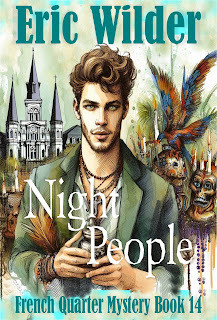 FOR IMMEDIATE RELEASE
FOR IMMEDIATE RELEASEContact: GaryPittenger
Email:wilderinok@yahoo.com
Uncover the secrets of the French Quarter with Eric Wilder's Thrilling New Mystery.
Night People,the 14th book in Eric Wilder’s acclaimed French Quarter Mystery Series, will bereleased on February 16, 2025, drawing readers into another gripping tale ofintrigue, voodoo, and supernatural suspense. Published by Gondwana Press, this334-page novel (ISBN 978-1-946576-22-4) continues the adventures of FrenchQuarter private investigator Wyatt Thomas as he delves into the heart of NewOrleans' most enigmatic mysteries.
In NightPeople, Wyatt Thomas is approached by his longtime friend Eddie Toledo with adesperate plea to find his missing niece, Eliza. The only clue Wyatt has is a canceled one-way AMTRAK ticket to New Orleans with the name of a French Quarterbotanica—La Porte Mystique—scribbled on it.
As Wyatt beginshis search, he is plunged into a labyrinth of danger and dark secrets. Alongthe way, he encounters:
Voodoo ritualsthat blur the line between life and death.
A disappearinghouse on Bourbon Street.
A sinistergroup of 300-year-old vampires exiled from Louis XIV’s court.
A mysteriousalternate realm known as the In-Between, a parallel French Quarter where therules of reality don’t apply.
Wyatt learns shocking revelations about his past in La Grotte de la Vérité (The Grotto of Truth).
Eric Wildermasterfully weaves the vibrant culture and rich history of New Orleans withsupernatural elements, creating a story that is as atmospheric as it isthrilling. Fans of his previous novels will relish the return to the FrenchQuarter’s smoky bars, haunted streets, and shadowy secrets. New readers will behooked by Wilder’s signature blend of mystery, action, and the mystical.
About theAuthor:
Eric Wilder isa veteran author whose French Quarter Mystery Series has captivated readerswith its unique mix of noir storytelling, supernatural intrigue, and the lushbackdrop of New Orleans. Known for his evocative prose and unforgettablecharacters, Wilder brings the city to life in all its haunting beauty.
Availability:
Night Peoplewill be available in paperback, e-book, and audiobook formats on February 16,2025.
Publisher:
Gondwana Press
1802 CanyonPark Cir, Ste C
Edmond, OK73013
For moreinformation or to schedule an interview with Eric Wilder, please contact GaryPittenger at wilderinok@yahoo.com.
Discover the secretsof the French Quarter in Night People. Pre-order your copy today and join WyattThomas in his most chilling adventure yet!
Night People Preorder
###

Born near Black Bayou in the little Louisiana town of Vivian, Eric Wilder grew up listening to his grandmother’s tales of politics, corruption, and ghosts that haunt the night. He now lives in Oklahoma, where he continues to pen mysteries and short stories with a southern accent. He authored the French Quarter Mystery Series set in New Orleans, the Paranormal Cowboy Series, and the Oyster Bay Mystery Series. Please check it out on his Amazon author page. You can also check out his Facebook page
December 31, 2024
Happy New Year 2025!

Happy New Year, everyone! Stay safe and enjoy yourselves.



Born near Black Bayou in the little Louisiana town of Vivian, Eric Wilder grew up listening to his grandmother’s tales of politics, corruption, and ghosts that haunt the night. He now lives in Oklahoma, where he continues to pen mysteries and short stories with a southern accent. He authored the French Quarter Mystery Series set in New Orleans, the Paranormal Cowboy Series, and the Oyster Bay Mystery Series. Please check it out on his Amazon author page. You can also check out his Facebook page
December 20, 2024
Wishing You a Magical Winter Solstice

Tonight marks the wintersolstice, the longest night of the year and a celestial event celebrated bycivilizations throughout history. The solstice occurs when the Earth's axialtilt positions the Northern Hemisphere farthest from the sun and has long beena time for reflection, reverence, and renewal.
Thewinter solstice represented a profound moment of balance and hope for theancients. Though longest tonight, the darkness was not feared but embraced as aprelude to light’s return. In Stonehenge, England, and Newgrange, Ireland,ancient monuments were precisely aligned with the solstice sun, underscoringits significance as a harbinger of new beginnings. Across cultures, from theYule celebrations of Northern Europe to the Inti Raymi festivals of the Andes,people lit fires, shared feasts, and performed rituals to honor the cycles ofnature.
Whatwisdom can we take from these ancient observances? The winter solstice invitesus to pause and honor the stillness. The long night provides a canvas forintrospection—a time to acknowledge our struggles, celebrate our endurance, andplant the seeds of intention for brighter days ahead.
Ina modern world dominated by constant motion and artificial light, the solsticereminds us that darkness, too, has its purpose. Ideas take root in the quiet and the shadow, dreams are born, and resilience is forged.
Asthe solstice passes, the days will begin to grow longer. Let this be a reminderthat even in the depths of winter, the promise of spring is not far behind.Tonight, take a moment to step outside, breathe in the crisp air, and marvel atthe ancient rhythms of our planet. Embrace the dark, for it is the cradle oflight and renewal.
####


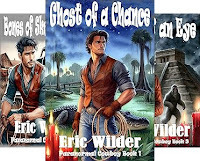
Born near Black Bayou in the little Louisiana town of Vivian, Eric Wilder grew up listening to his grandmother’s tales of politics, corruption, and ghosts that haunt the night. He now lives in Oklahoma, where he continues to pen mysteries and short stories with a southern accent. He authored the French Quarter Mystery Series set in New Orleans, the Paranormal Cowboy Series, and the Oyster Bay Mystery Series. Please check it out on his Amazon author page. You can also check out his Facebook page.
October 2, 2024
Press Release - Wild Magnolias
FOR IMMEDIATE RELEASE
Uncover the Mysteries of the French Quarter with EricWilder’s Latest Thriller, "Wild Magnolias"
New Orleans, LA – October 2, 2024 – Prepare to be captivatedby the latest installment in Eric Wilder's beloved French Quarter MysterySeries. "Wild Magnolias," Book 13 in the series, will be available ine-book, audiobook, and paperback formats starting October 5, 2024.
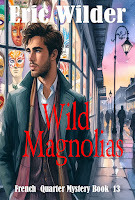
Since the series debut in 2010 with "Big Easy,"readers have been enchanted by the adventures of French Quarter P.I. WyattThomas. Known for its richly woven tapestry of New Orleans culture and itsarray of quirky characters, the series continues to deliver thrilling andatmospheric mysteries. In "Wild Magnolias," Wyatt Thomas returns,ready to dive into a new case amid the bustling energy of French Quarter Fest.
About "Wild Magnolias":
In this latest installment, Wyatt Thomas is hired by NewOrleans socialite Evelyn DuPont to recover a stolen treasure: her special firstedition of William Faulkner’s "Mosquitoes." This rare edition isvaluable and irreplaceable, containing the full version of Faulkner’smanuscript, including three chapters removed by the publisher before thenovel's original release. As Wyatt navigates the vibrant, chaotic streets ofthe French Quarter, he encounters many memorable characters, from bartender BertramPicou to the enigmatic voodoo mambo and Tulane English lit professor MamaMulate.
Eric Wilder's French Quarter Mysteries:
Eric Wilder's series has consistently delighted fans withits immersive portrayal of New Orleans, blending mystery, history, and thesupernatural. "Wild Magnolias" promises to uphold this tradition,drawing readers into a world where the past and present intertwine and whereevery street and shadow hides a story.
Praise for the Series:
Readers and critics alike have praised the French QuarterMystery Series for its authentic depiction of New Orleans and engaging,suspenseful plots. Each book is a testament to Wilder’s talent for creatingstories as complex and captivating as the city itself.
Release Details:
"Wild Magnolias" will be available for purchase onOctober 5, 2024, in e-book, audiobook, and paperback formats. Fans of theseries and new readers alike can look forward to another enthralling journeythrough the heart of the French Quarter.
For more information, review copies, or to schedule aninterview with Eric Wilder, please contact:
[Gary Pittenger]
[wilderinok@yahoo.com]
[405-590-4415]
[Gondwana Press]
[1802 Canyon Park Cir Ste C]
[Edmond, OK 73013]
Stay connected:
Visit [https://bit.ly/47Rueg6] for updates and exclusivecontent. Follow Eric Wilder on Facebook: [https://facebook.com/louisianamystery... on X: [https://twitter.com/ericwilderok]
Dive into the mystery and magic of New Orleans with"Wild Magnolias," and join Wyatt Thomas on his latest adventure inthe French Quarter.
# # #
About Eric Wilder:
Eric Wilder is the acclaimed author of the French QuarterMystery Series, which has captivated readers since the release of "BigEasy" in 2010. Wilder’s love for New Orleans and its unique culture shinesthrough in his writing, bringing the city and its vibrant characters to life onevery page.
###
Born near Black Bayou in the little Louisiana town of Vivian, Eric Wilder grew up listening to his grandmother’s tales of politics, corruption, and ghosts that haunt the night. He now lives in Oklahoma, where he continues to pen mysteries and short stories with a southern accent. He authored the French Quarter Mystery Series set in New Orleans, the Paranormal Cowboy Series, and the Oyster Bay Mystery Series. Please check it out on his Amazon author page. You can also check out his Facebook page.



August 16, 2024
The Day Elvis Died - short story

It's August 16th, and I just saw the headline: The Day Elvis Died. Though it was forty-seven years ago, I vividly remember what I was doing and where I was when I heard the news. I was thirty-one at the time and had recently undergone a divorce from my first wife, Gail.
I was on a lonely east Texas blacktop road about twelve miles from Linden, where Don Henley of the Eagles grew up. On that day in 1977, I was on the run. From a couple of girlfriends and not the law.
I was single, working as a geologist for Texas Oil & Gas, and experiencing freedom for the first time in seven years (the duration of my first marriage.) As an oil and gas geologist, I developed drilling prospects. I thought them up, put my ideas on paper, and Texas Oil & Gas drilled them.
In 1977, Texas Oil & Gas was the most active driller in the U.S. They had offices in several cities, and Oklahoma City was where most of their wells were generated. In Oklahoma City, I was the number one prospect generator and, at least in my mind, was the Prospect King of the World.
I know! I probably did more damage to the earth than any hundred people. I was very good at what I did and didn't know any better. Did I mention it was the height of the Disco Era? Women were burning their bras; I was on what seemed an unlimited expense account, had a company car, and felt invincible. After seven years of marriage, which included a stint in Vietnam, I was still naïve about relationships.
I had a girlfriend named Carol, a gorgeous blond lease broker who smoked marijuana and was familiar with many illegal drugs. She was also the wildest woman I had ever met. I'm talking sex, riding motorcycles at breakneck speeds-anything dangerous. I was in lust for her.
TXO, as Texas Oil & Gas was known, had many good-looking secretaries. Nowadays, fraternization among employees is not a wise idea and probably wasn't even then. It mattered little because an attractive brunette named Gayle had her sights on me. We finally had a dinner date and ended up at her house, where her two small sons precluded us from anything other than heavy petting. She said she would visit my apartment next night and rectify the problem. Her visit didn't disappoint and left me in a quandary.
Too much water under the bridge precludes me from remembering how Gayle and Carol got crosswise, although they somehow did. Being the coward I am, I fled Oklahoma City for the weekend, hoping things would cool while I was away. My parents lived in northwest Louisiana, and I headed there instead of facing the wrath of two beautiful women. It was on my trip south when I heard the news of Elvis's imminent demise.
Forty-seven years have passed, and Carol and Gayle are in my rearview mirror. Memories are almost forgotten notes in a never-ending chord progression, and I still remember them. Carol and Gayle are like unfinished symphonies whose melodies linger forever in the recesses of my brain.
Authors and prospect geologists have one thing in common: they are both paid liars. And me? I'm still at it, though my days as a bedroom Casanova are now largely in my dreams.
###
Born near Black Bayou in the little Louisiana town of Vivian, Eric Wilder grew up listening to his grandmother’s tales of politics, corruption, and ghosts that haunt the night. He now lives in Oklahoma, where he continues to pen mysteries and short stories with a southern accent. He authored the French Quarter Mystery Series set in New Orleans, the Paranormal Cowboy Series, and the Oyster Bay Mystery Series. Please check it out on his Amazon author page. You can also check out his Facebook page.



May 29, 2024
Diamonds in the Night - a short story

DIAMONDS IN THE NIGHT
Slow rain, dimpling pools of water along ancient streets, fell in theFrench Quarter. As it did, it createdcolorful shadows in flashing neon that danced on surrounding brickmasonry. Johnny T. Sampson didn'tnotice. He had a distasteful task tocomplete and jerked his collar around his neck as he glanced back at the lightsof Bourbon Street.
Friday night droves oftourists, crowding the narrow thoroughfare, ignored bone-chilling humidity inthe Quarter. Among them were severaltipsy college girls who brushed against Johnny T, flirting with him as hepassed. Seeing only trouble in his asheneyes, they shrugged and kept walking.
Johnny T. touched his jacketand inhaled deeply for the tenth time in as many minutes, letting damp airflood his lungs. With temples throbbinglike a jazz funeral, he turned away from flashing neon and melded intoLafitte's shadows. Soon, he was out ofsight. One block from the strip-showbarkers and foot-long hot dogs, the Quarter sucked him up like Iberville'sashes.
Rain dribbled down JohnnyT's neck as he made his way between old buildings that, amid bleak darkness,mimicked eroded mountain peaks. He hadlived in the city since birth but despised the cloying dampness and constantrain. Now, his feet were wet fromtrudging through puddles, and a drunken bum accosted him as he approached RoyalStreet. Stumbling up to Johnny T, theman stunk of wine and vomit.
"Can you give me adollar for a cup of coffee?"
Johnny T didn't answer. Instead, he made a face and continuedforward. Persisting, the bum said,"Go back to Africa."
Johnny T ignored the drunk,walking faster and quickly eluding him. Still, the man's words burned into his brain like a short round ofwillie-peter. Times had changed. Winos once stayed south of Canal Street -mostly in the blue-collar district around St. Charles Avenue. Lately, they had begun gravitating toward thelights and tourist money of the French Quarter. Johnny T. Sampson didn't like it.
Johnny T wiped away waterdripping down his forehead, glanced at his watch, and hurried down the street,wanting to reach Twotime's apartment on Esplanade before the dealer left on hisrounds. Streets were dark and deserted,and his heels, combined with a mournful tugboat whistle to replace the oldwino's taunts, echoed vacuously against uneven cobbles. The silence pleased him.
Johnny T soon reached theold French government building, long ago converted to apartments, where Twotimelived. Dim light filtered through giantoaks surrounding the complex as he studied the names inscribed on entrybuttons. Twotime responded on the firstring through a tinny door speaker.
"Who is it?"
"Twotime, it'sme."
When a sharp buzzinterrupted the silence, Johnny T pushed open the heavy oak door and walkedinto a garden courtyard where lush vegetation abounded. As he did, sugary smells and tactilesensations instantly confronted his senses. Beads of moisture dripped from rubbery palms, their prehensile trunksbent and twisted. Like tired old menwaiting for the streetcar on St. Charles Avenue, Johnny T thought.
Potted plants lined the mazeof walkways, and baskets of hanging bougainvilleas draped from everyconceivable hook and grapple. Johnny Tmade his way along the crumbling mortar pathway, breathing deeply of thecourtyard that reeked of sweetness and antiquity. Fountains dripped warm water from rusty pipes,and he tossed two quarters into one for good luck before starting up thewrought iron stairway.
"Door ain'tlocked," someone said from behind a third-floor doorway.
Johnny T twisted the oldbrass handle and entered Twotime's murky apartment illuminated only byflickering candlelight. Twotime waitedat a cheap, chrome-legged kitchen table and grinned when he saw Johnny T.Sampson.
"Johnny T. My man," he said, standing and dapping aclose-fisted greeting.
"Heard you had somekiller smoke," Johnny T. said, taking a chair across cracked Formica fromthe dealer without waiting for an invitation.
"Heard right, JohnnyT."
Twotime pushed the chair outof his way and searched through the single cabinet nailed carelessly to thewall. No more than ten feet wide, thenarrow apartment consisted of one folding bed, a chipped porcelain sink, and asmall closet with a commode and leaky shower head. Faded curtains, replete with mildewed roses,draped the closet door, and yellowed plaster walls sweated from incessanthumidity.
Finding the package, Twotimeplaced it on the table in front of Johnny T. "Best shit I ever had," he said, still grinning. "Sample the merchandise?"
Johnny T nodded, watchingTwotime extract a package of rolling papers from a cigar box beneath the table.Twotime continued to grin, humming an unrecognizable tune as he rolled apencil-thin joint. Twotime's dampundershirt plastered his torso. Hissweaty shoulders glistened, contracting into knotty balls as he worked. Frowning concentration masked his face, andhis ivory teeth flashed in candlelight as the red bandanna around his neckabsorbed sweat beading down his face. Dormant humidity, trapped in the tiny room, made Johnny T feel like hewas trying to catch a breath underwater.
Wiping sweat from his ownforehead, he closed his eyes, opening them at Twotime's question. "Still going to Xavier part-time, JohnnyT?"
"I had to dropout."
Twotime glanced up from thetabletop, dark concern etching his brow. "What happened, my man?"
"Kayla'spregnant."
"Your girl ispregnant?"
"I've got a job on thedocks now. It pays well, but it leaves no time for study."
After Twotime rolled thejoint, he magically produced a lighted match from beneath the table's decimatedsurface and held the flame to the joint until it flamed. Inhaling deeply, he held the smoke in hislungs to heighten its effect. His biggrin returned as he expelled a blue plume of smoke.
Twotime rolled his browneyes, dilated now and surrounded by seas of bloodshot white, before handing thejoint to Johnny T. Sweet and pungentsmoke combined with the dank odor of damp clothes and old construction asJohnny T put the joint beneath his nose. Closing his eyes, he let the acrid vapor waft into his lungs, only openingthem after Twotime's question.
"Hot in here, JohnnyT. Take your jacket?"
When Twotime stood from hischair to take the coat, Johnny T. recoiled, clutching the jacket and leaningaway from Twotime's extended hand.
"Something thematter?"
Johnny T. shook hishead. "Don't want to catch coldwhen I go back outside."
Twotime nodded, and Johnny Twiped his mouth with the palm of his hand. He quickly took another hit from thejoint before handing it across the table. Then he leaned back on two spindlychrome chair legs and said, "Trouble, Johnny T?"
Despite Twotime's seriousquestion, Johnny T failed to stifle a momentary giggle caused by the creeperweed. Finally, he said, "Temporarysetback. Nothing I can't handle."
"Need some money?"
Johnny T cocked his headalmost imperceptibly and said, "Who doesn't?"
"How much youneed?"
Fumbling for his wallet onthe nightstand behind him, Twotime turned his back to the table. When he did, Johnny T drew a breath of stale,marijuana-flavored air and explored the pocket of his coat with his fingertips. He flinched as Twotime turned around.
In Johnny T's eyes, Twotimesaw the same look the college girls on Bourbon Street had seen. For a long moment, silence became a mutedroar above the crackling of burning candlewick and continued until Johnny Tlowered his gaze, reached across the table, and clasped Twotime's wrist.
"No, man," he saidin a measured whisper. "Keep yourmoney. I'll think of somethingelse."
"Are you sure, JohnnyT?"
Johnny T reached for hiswallet, hand trembling. "I'msure. How much I owe you for thegrass?"
Twotime shook his head. "Weed's on me this time."
Johnny T protested, butTwotime insisted, bundling the package and handing it to him.
"Thanks, Twotime,"Johnny T said, feeling giddy. "Gotta go."
"Change your mind andneed my help, Johnny T, don't be afraid to call."
Johnny nodded. His legs were wobbly, and his hands suddenlyshaking in an uncontrollable shudder. Ashe held the door, Twotime watched the younger man stumble outside and descend therain-slick stairs.
"Don't bust your ass,Johnny T," Twotime said, shutting the heavy door behind him.
Johnny T gripped the coldiron rail, staggering down the stairs as a muffled whoosh of warm air escapedfrom Twotime's apartment. Reaching thecourtyard, he looked both ways with exaggerated caution as gentle rain continuedto fall. Now, cloying garden odors and apersistent buzz in his head elevated his senses as it dulled his faculties, theparadox of the weed. Proceeding slowly,he opened the heavy courtyard door and followed gray shadows back downEsplanade.
Darkness made himinvisible. When he reached the leveealong the Mississippi River, moaning boat whistles broke the silence, andflickering running lights flooded his brain. When he reached the French Market, he found fruit and vegetable peddlersarranging their wares. He continued walking,making his way across the levee, following the River Walk toward the noise andlights of Jackson Square. He stoppedwhen he reached the river's edge.
Shutting his eyes, Johnny Tdrew warm air into his lungs to calm his nerves. Alone and shrouded by river sounds andpersistent gloom, he finally opened them and stared at boats along the river. Stark tranquility transfixed him as heremoved the snub-nose from his jacket, tossed it into the river, and listenedfor its dull splash.
Salty air, drifting up fromthe Gulf, mingled with piquant chicory-laced coffee and slowly rottingvegetation as he walked along the levee. Cold rain had ceased falling, leaving only large puddles on the streets. When he reached the heart of the Quarter, hefound a late-night, early-morning crowd milling around outdoor patio tables atthe Cafe du Monde. Because of incessantrain, the crowd was thinner than usual, and Johnny T quickly found an emptytable. He ordered coffee from awhite-smocked waiter, then rested his head on the table, allowing spilled sugarto dust his forehead like carelessly applied makeup.
As Johnny T. Sampsonlistened, music from a mellow clarinet floated through the Quarter, and shoutsand laughter rose from beyond Pirate's Alley. He could hear the traffic clamor on Canal Street as it punctuatedmuffled darkness, creating illusions of reality and allusions oftransmutation. It didn't much matter.
A mule-drawn carriage clattered to a stop atthe corner, delivering a romantic couple to the edge of the scene. Holdinghands and undeterred by the light rain that had begun to fall again, they tooka table beside him. Lost in a drug-induced reverie, Johnny T remained obliviousto their presence. Under the flashing neon lights, the rainwater sparkled likediamonds, glistening in the night as it flowed along the streets and into thestorm drain.
####
Born near Black Bayou in the little Louisiana town of Vivian, Eric Wilder grew up listening to his grandmother’s tales of politics, corruption, and ghosts that haunt the night. He now lives in Oklahoma, where he continues to pen mysteries and short stories with a southern accent. He authored the French Quarter Mystery Series set in New Orleans, the Paranormal Cowboy Series, and the Oyster Bay Mystery Series. Please check it out on his Amazon author page. You can also check out his Facebook page.
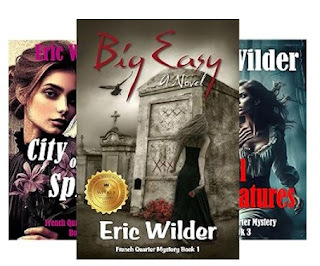


April 14, 2024
Krewe of Illusion - Chapters

Few places are better backdrops for Gothic mystery than Louisiana, and what could be more Gothic than a haunted mental facility formerly known as the Louisiana Hospital for the Insane? When crime boss Frankie Castellano learns he has a half-black sister who was a patient at Pinebridge Mental Hospital, he hires French Quarter P.I. Wyatt Thomas to find her. When Wyatt travels to the bucolic central Louisiana town of Pinebridge to investigate, he begins losing his grip on reality. He soon realizes there's a thin line between truth and illusion. Krewe of Illusion is available for presale on Amazon and will be released in June. Here are the first three chapters of Krewe of Illusion. Hope you love it.
Krewe of Illusion
A novel by
Eric Wilder
Chapter 1
A
glorious spring had arrived in New Orleans.Jazz Fest had just concluded as I sat at the bar of Bertram Picou’s mostlyempty drinking establishment on Chartres Street in the French Quarter. Someoneentered the bar that I recognized. Seeing me, he smiled and walked over. It wasFrankie Castellano, looking wealthy in thousand-dollar shoes and a suit worthmore than most people make in a year.
Frankie was one of the mostpowerful mob bosses in the South and was often referred to as ‘Don of theBayou.’ He had dark hair and eyes and a receding hairline. His bulldog-likeface made him look angry even when he was smiling.
“How you doing, Wyatt?”
“I’m good, Frankie. Howabout you?”
“Me too,” Frankie said.“May I join you?”
“Pull up a stool,” I said.
Frankie sat and said,“Where’s Bertram?”
He laughed when I said,“Probably on his way to the bank since he made so much money during Jazz Fest.”
“Me, Adele, and Toni justcaught the last act of Jazz Fest.”
“Are they with you?” Iasked.
“Over on Royal Streetwindow shopping.”
I ducked under the bar andsaid, “Then you probably need a drink. Scotch?”
When Frankie saw the bottleI poured from, he said. “Good memory. Monkey Shoulder is my favorite brand.”
I handed him the scotch andsaid, “You’re here for more than a drink and to test my memory. How can I helpyou?”
“A little problem I needsomeone to look into.”
“Glad to help, though youusually call Tony on such matters,” I said.
Former N.O.P.D. homicidedetective Tony Nicosia had retired from the force under duress and was now,like me, a private investigator. I’d worked for Frankie in the past, thoughalways alongside Tony Nicosia.
“Tony and Lil are onvacation in Italy,” he said.
“I just finished my lastcase a few hours ago, and my dance card is open,” I said. “Tell me how I canhelp?”
“Locate a missing person.”
“I can do that. Who do youwant me to find?”
“My sister.”
“I’ve known you for a longtime, Frankie. I didn’t know you had a sister.”
“Neither did I until a fewdays ago.”
“Maybe you’d betterexplain,” I said.
“This past Mardi Gras, Iwas king of the Krewe of Illusion. You familiar with it?”
The Krewe of Illusion wasone of the oldest and most exclusive carnival clubs in New Orleans. It wasrumored that only the city's richest and most powerful men ever ruled as Kingof Illusion, and then only after donating a cool million bucks. Frankie’s questionmade me smile.
“Of course. My grandfatherwas King of Illusion once.”
It was Frankie’s turn tosmile. “I keep forgetting your granddad was governor and the most powerful manin Louisiana.”
“Unfortunately, none of itrubbed off on me.”
“It sometimes doesn’t payto keep a high profile,” Frankie said.
I understood what Frankiewas insinuating. My grandfather was indeed powerful and had paid for his powerby being assassinated in the capitol rotunda. I skipped over Frankie’sreference.
“Sorry I interrupted.Please continue your story,” I said.
“The Krewe has specificrules, and having Adele as my queen wasn’t an option. The committee choseHarper Devereaux to serve as queen. Do you know who I’m talking about?”
“Me and everyone else inNew Orleans,” I said.
Harper Devereaux was aquintessential New Orleans socialite, a young woman as gorgeous as she waswealthy. The Devereaux family was among the wealthiest and most powerfulfamilies in New Orleans.
“Trust me when I tell youthe amount of time Harper and I had to spend together didn’t endear me withAdele.”
“I can imagine.” WhenFrankie killed his scotch, I said, “Another?”
“Please.”
I stood across from him onthe other side of the bar and refilled his glass straight from the bottle.
“Was Miss Devereaux the onewho informed you about your sister?” I asked.
“Yes.”
“Please explain how sheknew about her.”
“Harper is a philanthropistwho does extensive charity work and is on the Louisiana Office of BehavioralHealth board. One of the mental health facilities is the Pinebridge MentalHospital. Heard of it?”
“I had an aunt who spentsome time there,” I said.
“And?”
I poured Frankie morescotch. “The hospital doesn’t have a stellar reputation,” I said. “Maybe thingshave changed, but patients were once treated like inmates. Beatings, mentaldeprivation, and maybe even torture occurred. Want to hear more?”
“Your aunt?”
“She survived,” I said. “Iremember some of her stories. Was your sister at Pinebridge?”
Frankie nodded.“Apparently,” he said.
“Was she a patient?” Iasked.
“My father wasn’t a verysavory person.”
“I understand,” I said.“You just want to know the truth.”
Frankie nodded again. “Canyou help me?”
“Do you know your sister’sname,” I asked.
“Bella Donna Castellano.”
“Any idea when she wasborn?” I asked.
“No clue,” he said. “Rightnow, you know as much about my sister as I do.”
I grabbed my cell phone andsaid, “I’ll check my database.”
“You have a database?”
“We P.I.s can’t tap intothe database used by law enforcement. There are several extensive informationaldatabases available for the rest of us.”
After a minute, Frankiesaid, “Well?”
“Your family has no birthrecord of a female named Bella Donna Castellano,” I said.
“Impossible,” he said.“What database are you accessing?”
“It’s called Tracker, acomprehensive database for P.I.s,” I said.
Frankie smirked and said,“Maybe you’d better trade it in for one that works.”
“Bella Donna is yourhalf-sister,” I said.
“That’s crazy,” Frankiesaid. “My parents never divorced.”
“You and Bella Donna havethe same father but different mothers.”
“Let me see that,” he said.
When I handed him my phone,showing him the birth certificate of Bella Donna Castellano, he stared at it.
“What’s this supposed tomean?” he asked.
“Your dad had a mistressnamed Hattie Depoy. She was black and lived in the Lower Ninth Ward. BellaDonna was born in 1952. Your dad was only seventeen then and hadn’t marriedyour mother yet.”
“What happened to BellaDonna?” Frankie asked.
“Hattie was from Arkansasand moved back there, taking Bella Donna with her.”
“Then how did she end up inthe Pinebridge Mental Hospital?”
Frankie was agitated, and Ipoured him more scotch.
“Don’t know,” I said.
“Is Bella Donna stillalive?” Frankie asked.
I shook my head and said,“I can find no death certificate.”
Frankie downed his scotchand said, “I want you to go to Pinebridge and find out what my half-sister wasdoing there.”
“Because you think yourfather is somehow involved?”
“Paco was a mean oldbastard,” Frankie said. “I know how bad he treated Mama and me.”
“Bella Donna could bedead,” I said. “Pinebridge has a bad reputation. Many of their patients werenever accounted for, and some say they were buried in unmarked graves.”
I nodded when Frankie said,“Pinebridge was that bad?”
“There are all sorts ofunconfirmed allegations of rape, bondage, torture, and even murder,” I said.
“How the hell did they getaway with that?” Frankie asked.
“Mental illness, untilrecently, has been a taboo subject. Therapeutical treatments such asfull-frontal lobotomies were green-lighted because not even medicalprofessionals knew for sure what they were doing. Bad things were swept underthe rug, and no one wanted to take responsibility.”
“If Bella Donna is alive, Iwant you to find her. She’s my sister, even if she is half-black.”
“I’d like to interviewHarper Devereaux. Can you arrange the meeting for me?”
“Why do you need to talk toher?”
“She’s on the board ofdirectors and can give us access to the Pinebridge facility without questions.”
Frankie grabbed his cellphone. After a short conversation, he said, “Harper will speak with you. Canyou go now?”
“Of course,” I said.
Frankie clutched my wrist.“You’re a former lawyer, and I know this goes without saying. . .”
“Whatever I learn, I won’tshare it with anyone other than you. You have my word.”
“Thanks,” Frankie said. Hepulled out his checkbook, wrote me a check, and handed it to me. “This is onlya retainer. Feel free to bill me for any expenses you may incur.”
Frankie smiled when I said,“I’ve worked for you before, and you’ve always been more than generous. Give meMiss Devereaux’s address, and I’ll head her way.”
“Wonderful,” he said. “Canyou pour me one more scotch before you go?”
I sat the bottle of MonkeyShoulder on the counter in front of him. “I’ll go you one better.”
***
The value of houses in theQuarter ranges from expensive to don’t ask. Miss Devereaux’s domicile was, ‘Youwon’t believe me if I tell you.’
I found Harper Devereaux’shome near the corner of Ursulines Avenue and Royal Street. It was a statelymansion with a stucco-over-brick façade the color of buttercream. Tallshuttered windows opened onto a wrap-around balcony overlooking Ursulines.
I rang the doorbell, halfexpecting a butler to answer. Instead, Harper Devereaux, dressed like a runwaymodel, appeared at the door, and I had to catch my breath.
“I’m Wyatt Thomas,” I said.“Frankie Castellano just called about me.”
Harper Devereaux wasstunningly beautiful. I’d seen her pictures on society pages, but they did herno justice. Long auburn hair draped her shapely shoulders and brown designerlow-cut sheath. Her smile told me she understood her appearance's effect on me.
“Come in, Mr. Thomas. Wecan talk in the den.”
The parquet floors, wickerfurniture, and hanging ferns in the foyer were perfect. Harper Devereaux smiledagain when she saw me looking.
“Your house is beautiful,”I said.
“Circa 1810 Creolecottage,” she said. “I picked the property up for a song and did extensiverenovations.”
“I can see you have.Impressive.”
I followed her to her den,which looked out into a courtyard through a floor-to-ceiling picture window.The door to the courtyard was ajar, and the babbling fountain filled the roomwith soothing vibes.
“The den is my favoriteroom,” she said. “It’s my haven from stress and life’s chaos.”
“I see why.”
A large white couchdominated the room, and the white cat lying on it didn’t move when HarperDevereaux sat beside it. I took a comfortable rocker near the couch.
“Now, Mr. Thomas, how can Ihelp you?”
“Please, call me Wyatt,” Isaid.
“Absolutely, and you cancall me Harper. How do you know Frankie?”
“Frankie’s wife Adele andher father Pancho owned an Italian restaurant in Metairie I frequented. I knewAdele and Pancho before I met him.”
“I see,” she said. “Can Iget you a drink?”
“I’m an alcoholic,” I said.
Harper smiled when shesaid, “A French Quarter P.I. who doesn’t drink? How tragic. Do you mind if Imix something for myself?”
“Absolutely not.”
Harper was young, probablyin her late twenties or early thirties, though she moved across the room likean A-list actress. She wheeled her antique liquor cart to the couch and mixedus each a lime and soda water.
“Cheers,” she said.
“You have an eclecticselection of liquor,” I said.
“Everyone in my familydrinks, and they all have expensive tastes. When they visit, I try toaccommodate their favorites. What was your favorite alcohol before you gave updrinking?”
“I’d degenerated to thestage that I would drink almost anything short of battery acid, but my favoritealcohol was scotch.”
She showed me a bottle inthe cart. “Have you ever tried Monkey Shoulder?”
“Never did,” I said. “Is itgood?”
“I don’t drink scotch,” shesaid. “You’re not here to talk about alcoholic beverages.”
“Frankie Castellano’s likea bulldog when he wants something. You ignited his fuse when you told him hehas a sister he knew nothing about.”
“I probably should havekept the information to myself,” Harper said.
“Frankie hired me toinvestigate. He’ll never be happy until he knows.”
“Pinebridge is a medicalfacility. I’m on the board, and there are HIPAA rules I have to follow.”
“Frankie’s family, and hehas a right to know,” I said.
“Probably so,” she said.“Where do I begin?”
“His sister’s name, forstarters.”
“Bella Donna Castellano.”
“How did you learn BellaDonna was a patient at Pinebridge?”
“The present administratorof the facility is a close friend of mine. She told me.”
“What’s your friend’sname?” I asked.
“Celeste Gauthier,” Harpersaid.
“I’d like to interviewher,” I said. “Can you arrange it?”
“Pinebridge is a day’sdrive from here in Central Louisiana.”
“I’ve been there,” I said.“My aunt was a patient there for a while.”
“Then you know the facilityhas a bad reputation,” she said.
I nodded. “Mental illnessis a social stigma. At least we’ve advanced beyond referring to mental healthfacilities as insane asylums.”
“Amen to that,” she said.
Chapter 2
I
t was mid-afternoon in the French Quarter,the sound of a passing horse-drawn carriage rumbling outside on the street.
“I’ve been planning a tripto Pinebridge. You can ride with me if you like.”
“Wonderful,” I said. Livingin the Quarter, I don’t need a car much.”
“When we get to Pinebridge,I'll take you wherever you need. If you stay longer than me, you can rent acar.”
“That’ll work,” I said.
“When did you want to go?”she asked.
“Soon as possible. I’llneed to pack and see to my cat.”
“You have a cat?”
She smiled when I said,“Just like every intelligent person I know.”
“Bring her with you. Sheand Silky will get along famously.”
“You sure?”
Harper put Silky into a catcarrier and said, “My car’s parked in the back.”
“Aren’t you going to pack?”I asked.
“I own a cottage inPinebridge,” she said. “I have clothes there.”
Harper’s car was a RangeRover. It had all the expensive amenities, and I could only imagine how muchshe had paid for the vehicle. I didn’t ask.
“Where to, Wyatt?” sheasked.
“Bertram’s bar on ChartresStreet. I have an apartment on the second floor.”
Bertram’s wasn’t far fromHarper’s house on Ursulines. When we arrived, she parked on the street outsideand exited the big SUV.
“Aren’t you afraid you’llbe towed?” I asked.
“I’m a Devereaux,” shesaid. “It will be here when we return.”
I drew a deep breath,wondering how anyone could be so confident. Her money, I thought as we enteredBertram’s. The establishment was rocking, and Bertram was mixing drinks at thebar. When he saw Harper and me enter the front door, he motioned for us to joinhim.
“Where you been?” he said.“And who is this gorgeous woman with you?”
“Frankie hired me to do ajob for him. I must pack a few clothes because I will be out of town for a fewdays.”
“Want me to take care ofthat mangy cat of yours?”
“She’s going with us?”
“What did Frankie hire youto do?” Bertram asked.
“Confidential, Mr. Nosy,” Isaid.
“You can tell old Bertram.It won’t get farther than this bar,” he said.
“Frankie swore me tosecrecy and would kill us both if he knew I’d told you anything.”
“Whoa! I don’t need to knowthat bad.”
“Harper Devereaux, meetBertram Picou, the owner of the best bar in New Orleans.”
“Can I get you something todrink, pretty lady?”
“Ginger ale,” she said.“Wyatt and I have a lot of miles to cover, and I don’t drink and drive.”
“Can you put it in ago-cup?” I asked. “It’s getting late, and I need to pack.”
Bertram poured Harper aginger ale and a lemonade for me.
“How long you going to begone?” he asked.
“Until I solve Frankie’smystery,” I said.
I nodded when he said,“Then keep me posted.”
Harper followed me upstairsto my apartment on the second floor. Compared to her stately mansion, mine waslittle more than one room comprising a bedroom and a kitchenette. My cat Kisseswas asleep on the bed.
“Oh, what a beautiful cat,”Harper said. “What’s her name?”
“Kisses.”
“What happened to hertail?” she asked.
“Born that way. Guess she’sprobably part-Manx.”
“Love your littleapartment,” she said.
“It’s comfortable and all Ineed. Kisses loves the balcony and so do I.”
“Don’t apologize,” shesaid. “People would kill to live in the heart of the French Quarter and have aview like you do.”
Cars passed on the streetbelow, rowdy college students shouting obscenities at the pigeons.
“Thanks,” I said. “How faris it to Pinebridge?”
“Two hundred miles, aboutthree hours of driving time for most people, less than that for me.”
“Should I increase myinsurance before we go?”
“You’ll be fine,” she saidwith a grin. “I’m a good driver.”
“Then I’d better hurry.Fast or slow, it’ll be dark when we get there.”
When Harper and I descendedthe stairs with my suitcase and cat carrier, Bertram’s bar was filled with newcustomers.
Bertram waved and noddedwhen I said, “See you when I see you.”
Harper’s expensive RangeRover was waiting for us in one piece, an N.O.P.D. cop standing beside it onthe sidewalk making sure of it. He smiled, saluted, and opened the door forher.
“I’m impressed,” I said.
After loading my bag andthe carrier with Kisses, she drove away and headed for I-10. We were soon onour way to Baton Rouge, the swampy lowlands characterizing the Bonnet CarreSpillway prevalent on both sides of the highway.
“We’ll head north afterreaching Opelousas,” she said. “Relax. We’re a long way from there.”
Relaxing wasn’t difficultin Harper’s opulent Range Rover. Cats that don’t know each other are oftenstandoffish, if not outright hostile. Silky and Kisses were exceptions and tookto each other quickly.
I had questions for Harper,though I refrained from asking her. Frankie didn’t want me to discuss the casewith anyone, and I thought I knew why. Despite Harper and Frankie's forty-yearage difference, I had a hunch they’d had an affair, maybe even an ongoingaffair. It would explain the bottle of Monkey Shoulders Harper kept in her den.
Affairs are very personaland most often secretive for apparent reasons. It seemed to me Harper hadshared her affair with Frankie with Celeste Gauthier, the administrator of thePinebridge Mental Hospital. If not, how did Ms. Gauthier even know about FrankieCastellano to the extent she told Harper about her discovery?
The reason might have beenthat Harper and Frankie had been the king and queen of the Krewe of Illusion.Maybe. I decided to ask her when the time was right.
My thoughts were shatteredwhen Harper asked, “Don’t you ever talk?”
“Sorry,” I said. “Years ofsingle living ruined me for small talk.”
“How did you become aprivate investigator?”
“I was a French Quarterlawyer, though years of alcohol abuse ended my marriage and legal practice. Iwas disbarred. When Bertram finally fished me out of the gutter, dried me out,and gave me a place to stay, I needed a job. P.I. work came easy for me.”
“You never tried to getyour license back?”
“I think about it from timeto time,” I said.
“And?”
I smiled and said,“Thinking about it is all it has ever come to. What about you?”
“What about me?” she said.
“You seem happy livingalone. Have you ever been married?”
When Harper answered myquestion, I could tell by the tone of her voice she hadn't taken offense.
“The right person has nevercome along,” she said. “Besides, I have Silky, and we’re happy.”
“What prompted Celeste totell you about Frankie’s sister?”
My question surprisedHarper, and I could tell she was displeased that I had put her on the spot.
“Celeste knew that Frankieand I had been king and Queen of Illusion. She thought I would be interested. Iwas.”
“Mardi Gras ended inFebruary. You and Frankie are still friends?”
“Frankie’s the mostpowerful man I’ve ever met,” she said. “He’s an extraordinary human being, andit’s an honor for me to call him a friend.”
Harper smiled when I said,“Frankie told me his wife was jealous of you.”
“Did he now? I can see why.We spent lots of time together, sometimes until late at night.”
“Did you and Frankie havean affair?” I asked.
“Inappropriate question,”Harper said.
I decided not to pursue thesubject. “What’s Pinebridge like?”
“Hilly with lots of pinetrees. There's not much there except for the hospital and the college. Theparish was dry until a year ago. Now, they have a café in the square calledRaven’s Roost that Celeste and I like. It has a bar and shaded seating on the patio.”
“Then you and Celeste aremore than just business associates.”
“You called Bertram nosy.That’s like the pot calling the kettle black,” she said.
“Sorry,” I said. “It’s aP.I.’s lot in life to ask questions.”
“It’s okay. Celeste caresfor the cottage I own in Pinebridge. She lives there, and we’re roommates whenI visit.”
I had fallen asleepsometime after we’d turned north at Opelousas. I opened my eyes when Harperawakened me with a shake of my knee. It was dark.
“Wake up, sleepy head.We’re here,” she said.
“Sorry I fell asleep onyou,” I said.
“No problem. There aremotels ahead. Name your poison.”
“Is there someplace closerto the center of town? I like to walk when I can.”
“There’s an old two-storiedhotel downtown near the hospital and the college,” Harper said. “It’sfamily-owned and anything but modern.”
“Sounds like it’s right upmy alley,” I said.
“I’ll drop you at the frontdoor and wait until you check in, and then we can visit the hospital,” shesaid.
She laughed when I said,“Celeste works this late?”
“She’s a workaholic.”
Dark streets typical of asmall Louisiana town marked the outskirts of Pinebridge. On our way to the towncenter, we passed motels, fast-food establishments, used car lots, andappliance stores. The town square was different, with a historic courthouse nearits center. The little town was old and dominated mainly by two-storybuildings. Harper pulled the Range Rover into the entrance to the PourteauHotel.
“Leave the cat carrier.Kisses can stay at my house. I’ll wait in the car while you check in,” shesaid.
Pourteau’s had a welcomingwaiting room and a smiling woman behind the counter when I entered.
“Help you?” she said.
“I need a room. I don’tknow for how long. Can I keep the check-out date open?”
“You bet,” she said.“Seventy dollars a night. We have a complimentary breakfast beginning at six inthe morning.”
“Wonderful,” I said.
She handed me a key andsaid, “Room 201 on the second floor. The best view in the hotel.”
“Great,” I said.
The room was small butclean and serviceable. The single window looked out over the town square. Iclosed the curtain, sat my suitcase on the bed, and went downstairs.
When I opened the door toHarper’s Range Rover, she said, “How’s the room?”
“Good,” I said.
“I called Celeste. She’swaiting for us at the hospital.”
“Great,” I said.
“Let’s stop by my house anddrop off the cats. Silky has spent lots of time there. They’ll have the run ofthe place and will love it.”
Harper’s little house wasanything but. The single-story Louisiana ranch-style house stood alone on abluff overlooking the Red River.
She grinned when I said,“Little?”
“I had a local architectdesign it based on Louisiana delta homes,” Harper said. “You won’t believe thedeck that overlooks the river.”
Harper pulled the RangeRover into the house’s three-car garage. When we took the cat carriers into theden, Harper turned on the lights. Silky and Kisses exchanged nose rubs withCeleste’s big Persian when we opened the doors to their carriers.
“Your house is awesome.Kisses may want to stay forever,” I said.
Harper checked the waterand food in the bowls beside the oversized fireplace.
“They’ll be fine. Let’s goto the hospital.”
The Pinebridge MentalHospital was nearby, and Harper parked in the lot in front. The modern façadewas an addition to what I could see, even in the dark, was a much olderfacility. The person at the front desk recognized Harper, smiled, and gave usthe high sign. I followed her down a darkened hallway to Celeste’s office. Whenwe opened the door without knocking, Celeste got out of her chair and embracedHarper.
Celeste proved asattractive as Harper, only older. Her long hair was darker and I guessed herage at forty-something. She was dressed in faded jeans and a pale blue sweater.From the duration of the embrace, I was aware the two women truly liked one another.
“Celeste, this is WyattThomas. He’s a private investigator from New Orleans.”
When Celeste shook my hand,I said, “Pleased to meet you.”
Celeste’s office seemedmore like that of a corporate bigwig than a Louisiana public servant. She satbehind her big oak desk as Harper, and I took seats in two of the spaciousoffice's expensive chairs.
“I’m so glad you made it inone piece,” Celeste said. “I worry every time Harper is on the road.”
“You’re not my mother,”Harper said. “I’m a great driver.”
“I can attest to that,” Isaid. “This facility is awesome, and my spine tingled when we walked down thehall. I hope you don’t have to spend much time here after dark.”
“It comes with theterritory,” she said. “I’m used to the ghosts.”
Celeste’s words had barelydied away when we heard an unearthly wail through the cracked window in heroffice.
“More than ghosts,” I said.“That sounded like a big cat.”
Chapter 3
C
eleste hurried to the window and slammed itshut with more force than was probably necessary.
“We aren’t far from theKisatchie National Forest. Swamps and woodlands thick with pines surroundPinebridge. Some people call it the pine curtain. If you let yourself getcaught up in the sounds of the night, it’ll drive you nuts.”
“This place is noticeablyold,” I said. “Can you fill in its history for me?”
“The facility, originallycalled the Louisiana Hospital of the Insane, has a sordid history. Sufferingpeople were sent here because there was nowhere else to put them. Medicaltreatments were either non-existent or bordering on the medieval.”
“We’ve come a long way,”Harper said.
“Thank God for that,”Celeste said. “This facility has less than a hundred patients and is a mereshadow of its former self. During its heyday, it had hundreds of patients fromevery part of the state. It was self-sufficient with a dairy, a hundred-sixty-acrefarm, a cathedral, and a cemetery.”
“Can you arrange a tour forme?” I asked.
“Of course,” Celeste said.“Most old outbuildings are no longer in use and in disarray. It isn’t a placeyou want to visit after dark.”
Before I could reply,someone began banging on the door. Sensing something neither Harper nor I did,Celeste hurried to the door and flung it open. A dark-haired young man dressedin jeans and a tee shirt stood in the doorway, obviously shaken from his distressedexpression.
“Billy, what’s the matter?”Celeste said.
“Trouble,” the young mansaid.
Celeste stood six inchestaller than Billy. Grabbing his shoulders, she shook him until he stoppedstammering.
“It’s okay. What’s wrong?”
“Mr. Marshal,” Billy said.“He’s bleeding.”
“What happened?” Celesteasked.
“Something terrible,” Billysaid.
“Where is he?”
“The cemetery,” Billy said.
Billy became even morenervous when Celeste asked, “What were you doing in the cemetery?”
“Noises,” he said.
“You mean like the noisesour patients make at night?”
Billy shook his head. “Morelike the scream of a woman.”
“Take me to him,” Celestesaid. “Harper, there’s a flashlight on my desk.”
Harper grabbed theflashlight and we followed Celeste and Billy out of the door. We’d gone no morethan ten feet when Celeste halted.
“We’re taking a shortcutthrough the psych ward, and you need to be warned. In this confined space, eventhe faintest sounds echo off the walls. Haunting noises punctuate the silence,each more unnerving than the last. Sometimes, it’s enough to scare the hell outof you.”
When Celeste entered acombination on a keypad to open a heavy metal door, it took less than a minuteto understand the reason for her ominous warning. Even in the dimly litcorridor, it was impossible not to see the faces of the tormented souls peeringfrom behind the tiny barred windows of their padded cells.
The plaintive cries ofpatients lost in the labyrinth of their minds wailed a heart-wrenching chorusof anguish reverberating off sterile walls, a chorus that lingered like amournful lament. Some voices were barely more than whispers, fragile echoes of fracturedsouls, their pain palpable. Harper clutched my hand and squeezed.
“I hate the sounds theymake,” she said. “I don’t know how Celeste tolerates it.”
Frenzied screams shatteredthe uneasy calm, signaling a moment of crisis. Footsteps echoed down anotherhallway and the metallic clinking of restraints and the rhythmic thud of heavydoors being locked. Whispers of fragmented conversations and delusionallaughter, devoid of joy, were a chilling reminder of the thin line betweensanity and madness.
Harper released my handwhen Celeste used the keypad to open the psych ward’s exit door. I could stillhear the cacophony of the tortured souls even after the metal door shut behindus with a dull thud.
As Celeste, Billy, Harper,and I emerged from the dilapidated rear of the old mental institution, the airhung heavy with the oppressive weight of the night. The moon, obscured by thickclouds, cast an eerie glow upon the desolate landscape, cloaking the abandonedoutbuildings and gnarled pine trees in shadow.
We traversed an old cobbledpath, our footsteps muffled by the damp earth and shrouded in a mist thatseemed to rise from the very soul of the forsaken grounds. A chorus of chirpingcrickets and the flickering dance of lightning bugs provided the only semblanceof life amid the graveyard silence.
With each step, the senseof foreboding deepened, amplified by the whispered legends of the institution'stormented past that echoed through the wind-swept corridors of memory.
We followed Billy throughthe murky darkness, our nerves taut, every rustle of leaves, and the distanthowl of a nocturnal creature sending shivers down our spines.
We reached an old cemetery,a somber testament to the forgotten souls who had once wandered these hallowedgrounds in search of sanctuary. Amongst the weathered headstones, a chillingsight awaited us: a man's lifeless body slumped against a moss-coveredmonument, the jagged wounds upon his flesh a grotesque tableau of savagebrutality.
The moon broke free fromits cloud-shrouded prison, casting its pallid light upon the scene,illuminating the man's twisted visage in stark relief. His eyes, frozen in asilent scream, bore witness to the horrors he had endured in his final moments,while the zigzag lacerations that marred his skin spoke of a violence born fromthe depths of primal instinct.
As we stood there,transfixed by the grisly spectacle, a sense of dread enveloped us like asuffocating cloak. At that moment, amid the desolation of the abandonedcemetery, I realized that we weren’t alone. The darkness held secrets far moresinister than I dared to imagine.
I touched the man’s carotidartery.
“There’s nothing we can dofor him,” I said. “He’s dead.”
Celeste’s hand went to hermouth. “Oh, my God! Are you sure?”
She embraced Billy and theyboth began to cry when I nodded and said, “I’m sorry.”
What killed him?” Harperasked.
“Don’t know,” I said. “Callthe police.”
Within ten minutes ofHarper’s 9-1-1 call, we heard the sirens.
“What now?” she said.
“This is a crime scene,” Isaid. “Don’t touch anything.”
We waited in the darkness,none of us speaking until the lights of police cars stopped in the parking lotof the old cemetery. Officers with flashlights soon appeared through the mistthat continued to rise from the ground.
When a man in blue pants, akhaki shirt, and a dark blue windbreaker with a Rapides Parish Sheriff’s officeinsignia approached us, he said, “I’m Detective Willoughby. Where’s the body?”
Celeste pointed theflashlight to the headstone the body was propped against. As police officersbegan spreading out, a black woman dressed the same as Detective Willoughbymotioned us to follow her. We stopped when we reached her white SUV policevehicle with the flashing lights.
“I’m Detective Goodwine,”she said. “Give me your names and tell me what happened here.”
The name sewn on thewindbreaker read Det. Maya Goodwine. Her short hair was swept back enough toreveal blue zircon earrings and a diamond ear piercing at the top of her ear.Except for her watch, the earrings and the piercing were the only jewelry she wore.Detective Goodwine took notes when we told her who we were.
“Do you know the victim’sname?” she asked.
“Oliver Marshal,” Celestesaid. “He was the hospital’s janitor.”
“How long had he worked forthe hospital?” Detective Goodwine asked.
“Probably more than thirtyyears,” Celeste said. “He was working here when I became Administrator.”
“Who discovered the body?”she asked.
“Billy came to my officeabout thirty minutes ago and told us about finding Mr. Marshall’s body,”Celeste said.
Billy was even moreanxious, shaking when Celeste nudged him toward Detective Goodwine.
“What were you doing in thecemetery?” she asked.
Billy stuttered when hesaid, “I heard a noise. I went to see what it was.”
“Billy is the hospital'scaretaker. He lives in one of the unused hospital rooms outside the mainbuilding,” Celeste said.
“I was outside my doorsmoking a cigarette,” Billy said.
“Did you know thedeceased?”
Billy nodded and said, “Wewere friends.”
Detective Willoughbyappeared through the darkness and motioned Detective Goodwine to join him.Following a brief conversation, they returned to the SUV.
“What killed Mr. Marshal?”Celeste asked.
“We’ll know more after thecoroner has time to examine the body,” Willoughby said. “You are free to go,though Detective Goodwine and I may have more questions for you later.” When westarted to leave, he said, “Not you, Mr. Thomas.”
“We’ll wait for you inCeleste’s office,” Harper said.
When they were gone,Willoughby said, “You’re not from around here.”
I showed him my P.I. badgeand license, and he donned reading glasses for a better view.
“I’m here on assignment,” Isaid.
“Mind telling us what for?”Detective Goodwine said.
“I’m looking for a missingperson who may have been a patient here years ago,” I said.
Willoughby handed my badgeand license back to me. “I don’t know how far along on your assignment you are,but don’t leave the area without checking first with us.”
I nodded and started toleave when Detective Goodwine said, “One more thing, Mr. Thomas. You’re anexperienced investigator. Did you see or hear anything else that might be ofinterest?”
“We were in Ms. Gauthier’soffice. The window was open, and we heard what sounded like a large cat.”
“A tom cat?” Willoughbysaid.
“Bigger. More like apanther,” I said. “I only got a brief look at the body, but it seemed to melike a big animal, possibly a cougar or some other large predator, attacked andkilled him.”
Detectives Goodwine andWilloughby exchanged glances and then handed me their business cards.
“We’ll be in touch,”Willoughby said.
The back door to thehospital was locked, so I took a long walk back to the front door. Celeste andHarper were waiting for me in the lobby.
“Celeste and I are going tothe Raven’s Roost in town for dinner and drinks. Come with us. When we finisheating, I’ll take you to your room.”
“Wonderful,” I said.
Celeste unlocked the doorto a black BMW and said, “Meet you there.”
I climbed into thepassenger seat of Harper’s Range Rover, neither of us speaking until she pulledinto the parking lot of the little café.
“You won’t have to take meto my hotel,” I said. “It’s just across the street, and I can walk.”
She grinned and said, “Youmay need me to hold your hand.”
“Maybe,” I said.
The Raven’s Roost was anold building renovated into a modern café and bar. A pretty young waitressgreeted us at the door.
“I’m Kayla,” she said.“I’ll be waiting on you.”
Kayla led us to a cornertable where hanging ferns and large potted plants blocked our view from therest of the establishment. The bistro was ominously dark. When Kayla seated us,I learned why.
“Most of our clientele arecollege students,” she said. “Pinebridge University is a Baptist college, andthe administration doesn’t allow drinking hard liquor.”
“How shortsighted of them.”
Harper and Celeste orderedmartinis. I requested a glass of lemonade.
“Wus,” Harper said.
“Sorry,” I said. “I have notolerance for alcohol. I’d be dancing naked in the streets.”
“I’d pay to see thathappen,” Harper said. “Celeste and I will take care of you.”
“Until the police show upand throw us all in jail,” I said.
“Do you have an opinionabout who or what caused Mr. Marshal’s death,” Celeste said.
Kayla, our pretty waitress,appeared at our table without drinks before I could answer.
“Are we eating tonight?”
“Yes,” Celeste said.“What’s your special?”
“Chicken strips and creamgravy,” Kayla said.
“Not me,” Harper said.“What else do you have?”
“Our catfish platter,”Kayla said.
“That’s what I’ll have,”Harper said.
“Me too,” Celeste said.
“All the way around,” Isaid.
“And another round ofmartinis,” Harper said.
When our dinners arrived,Harper was on her third martini. I was starved and ate with relish, as didCeleste. Harper seemed more interested in getting a buzz on and not losing itby eating. Having been guilty of the same thing when I was overindulging inalcohol, I recognized the syndrome. She left most of her dinner on the plateand ordered another martini when Kayla arrived to clear the table.
Harper’s words were slurredwhen she said, “This town is fucked up.”
“How so?” I asked.
“Everyone is so uptight andafraid they will shame themselves or their families if they follow theirhearts.”
“A different ideology,”Celeste said. “Every place in Louisiana can’t be the same as New Orleans.”
“Right about that,” Harpersaid. “Downtown Pinebridge isn’t exactly Bourbon Street.”
In an attempt to change thetopic of discussion, Celeste looked at me and said, “You haven’t told us whatyou think of the death.”
“If I didn’t know better,I’d have thought a big cat killed him,” I said.
“Crazy talk,” Celeste said.
“Don’t say that,” Harpersaid. Wyatt is an experienced investigator, and he’s so cute.”
Harper spilled her martinion me when she crawled into my lap. I glanced at Celeste and saw her staring ahole through me. Getting out of her chair, she grabbed Harper’s hand and pulledher out of my lap.
“I’m taking you home,” shesaid. “You can get your car tomorrow.
Kayla was at the table whenCeleste led Harper out the door.
“Another lemonade?” shesaid.
“Please,” I said.
When she brought mylemonade, she said, “Those two are here a lot. They argue like an old marriedcouple.”
She nodded when I said, “Isthat what they are?”
“Why are you in town, Mr.Thomas?”
“It’s Wyatt,” I said. I’m aprivate investigator looking for someone who spent time in the PinebridgeMental Hospital. I’m looking for answers.”
“Celeste is theadministrator. “She’ll know.”
“Maybe,” I said.
“You think she’s coveringsomething up?” Kayla asked.
“The thought crossed mymind,” I said.
“My mom is the chieflibrarian at Pinebridge University. There’s nothing she doesn’t know aboutwhat’s going on in Pinebridge.”
“I’d like to meet her,” Isaid.
“How about dinner tomorrownight?”
###
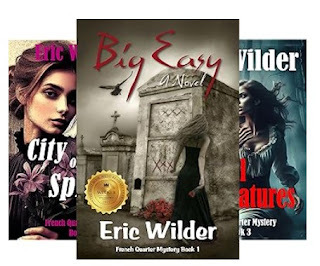


Born near Black Bayou in the little Louisiana town of Vivian, Eric Wilder grew up listening to his grandmother’s tales of politics, corruption, and ghosts that haunt the night. He now lives in Oklahoma, where he continues to pen mysteries and short stories with a southern accent. He authored the French Quarter Mystery Series set in New Orleans, the Paranormal Cowboy Series, and the Oyster Bay Mystery Series. Please check it out on his Amazon author page. You can also check out his Facebook page.
March 18, 2024
Oyster Bay Limbo - Chapters

Oyster Bay Limbo is my new book, number 4 in the Oyster Bay Mystery Series set on a magical island off the coast of Louisiana in the Gulf of Mexico. The action begins with an early-morning duck hunt culminating in the siting of a band of ghostly pirates. The action heats up when Amani LeClair, a beautiful and mysterious woman, appears on the beach in an old Volkswagen van. Who is Amani, and what is she looking for? Why is a coven of witches coming to the island? Will Louisiana mob boss Frankie Castellano prevail in his lawsuit and boot the island's quirky inhabitants out of their happy homes? Limbo arrives on March 26 and is available for pre-sale until then for only $2.99. Order your copy now, buckle up, and hold on tight because you're in for a wild ride.
Chapter 1
Dawn was hours away when John Pierre Saucier banged on Jack Wiesenski’sdoor. J.P. was six feet tall with dark hair and eyes and hadthe good looks of a movie star and the self-confidence to go with it. He’dspent over twenty years as a deputy with the police department and had wantedto retire for years and start a dog training academy. When his captain firedhim, he had no further reasons to procrastinate.
Lucky, J.P.’s chocolate Labrador retriever, waited for Jack to let them in. The footstepspadding toward the door preceded someone opening a crack and peering out.
Seeing it was J.P. and Lucky, Jack, dressed in a blue nightshirt, motioned them to enter,then padded into his little galley as he wiped the sleep from his eyes. Jack was short, probably no taller than five-six or seven. Hewas wiry, closely shaven, with brown hair buzzed almost to his scalp. From theodd shape of his mouth, It was hard to tell if he was smiling or frowning.
“What the hell, J.P.? It’s not even five yet.”
J.P. and Luckyfollowed Jack to the plank table in his little kitchen he called his galley.
“Surely, you didn’t forget our duck hunt?” he said.
“I thought you were kidding,” Jack said.
“You said you wanted to go,” J.P. said.
“You didn’t tell me we were leaving in the middle of thenight,” Jack said.
“We have to set our decoys out and be in the blind before thesun comes up,” J.P. said. “You coming or not?”
“My brain doesn’t work without coffee. I need a cup,” Jacksaid.
“I have a thermos in the truck,” J.P. said. “Where’s Chief?”
“I think he thought you were kidding,” Jack said.
“Get your clothes on, your shotgun, and let’s move it. Wedon’t have much time,” J.P. said.
“Hell, J.P.! I don’t even have a shotgun.”
J.P. shook his head.“This ain’t Massachusetts. If you live in Louisiana, you have to hunt ducks.Don’t you know anything?”
“I’m a fisherman, not a hunter,” Jack said.
Grogan ‘Chief’ La Tortue entered the front door, followed byhis two dogs, Coco, a chihuahua, and Old Joe, a German shepherd.
Chief was an imposing man of American Indian descent. Hehadn’t bothered combing his shoulder-length gray hair, and it looked like he’dslept in his chinos, moccasins, and blue work shirt. J.P. was at least six inches shorter than the big Atakapa Indian. Afterpropping his shotgun against the wall, Chief went to Jack’s coffee pot, findingit empty.
“What the hell?” he said. “You swearing off coffee thesedays?”
“It’s not even five o’clock yet,” Jack said. “I’m an earlyriser. This is ridiculous.”
“I have an extra shotgun you can use,” J.P. said. “Get your clothes on. Chief and I will start the pot.”
Jack grumbled as he disappeared into his bedroom. Dressed incamouflaged fatigues, J.P.’s duck call hung around his neck from a leather strap. Chief found Jack’sbottle of Dominican rum and poured some into a mug as the coffee pot beganperking.
“I haven’t hunted ducks in ten years,” Chief said. “Today’sthe first day of duck season. What’s your hurry?”
“Lucky holds the gold medal as the best duck-hunting dog inSt. Bernard Parish. The competition is coming up next week. We’ve barely had achance to practice with everything happening on the island. The two of us needthis hunt,” J.P. said.
“Hell, J.P., Coco, and Old Joe are raring to go. Maybe Lucky can teach them a thing or two.”
J.P. was grinning ashe poured himself a shot of Jack’s rum and topped it with the brewing coffee.
“Hope Jack doesn’t want to take Oscar,” he said. “Bulldogscan’t swim.”
“That’s a fact,” Chief said. “Doesn’t matter. I doubt we’llget out of the door without him.”
Chief and J.P. turned whensomeone said, “Or us.”
It was Odette Mouton and her two dogs, Mudbug and Bruiser. Mudbug was small, and Bruiser large. Odette was a formerBourbon Street stripper, short, barely five feet tall, her wind-swept blondhair contrasting with her dark Cajun eyes. She’d hitchhiked to Oyster Islandafter meeting Jack and Chief at Rockies, a Bourbon Street strip club, and wasnow part owner of the Oyster Island Dog Training Facility.
“What are you doing here?” J.P. asked.
“I like hunting ducks,” Odette said.”
“You can’t go. There’s not enough room in myduck blind.”
“Maybe you should have built a bigger blind,”Odette said.
“Odette can take my place,” Jack said. “I’mnot into hunting.”
“You’re into drinking, aren’t you? That’shalf the fun of a hunting trip,” J.P. said.
“I like to drink,” Odette said.
“Okay,” J.P. said. “The only dog that needs to go is Lucky. The restcan stay here.”
“I’ll stay with them,” Jack said. “You cantell me about the trip when you return.”
“Me too,” Chief said. I never liked wastingtime sitting in an uncomfortable duck blind.”
J.P. wasfrowning when he glanced at Odette.
“I don’t know about this,” he said.
“You look like twins dressed in matchingcamouflage fatigues,” Jack said. “Get out of here and have fun.”
Odette and J.P. grumbled as they loaded their shotguns and ice chestsinto the back of the island’s awaiting all-terrain vehicle. Anticipating thehunting trip, Lucky was the only happy member of the diminished group. J.P. continuedgrumbling when Odette beat him to the driver’s seat.
“You don’t even know where we’re going,” hesaid.
“I take directions,” she said.
“Fine. You know where Drusy Lake is on the island'sbackside?”
“Bruiser, Mudbug, and I have a swimming spotthere.”
“You never told me that,” J.P. said.
“Lots of things I never told you,” Odettesaid.
“You ever hunted ducks?” J.P. asked.
“Since I was about three years old,” Odettesaid. “Cajuns invented duck hunting; my mama could make the best duck gumbo youever tasted.”
“Yum,” J.P. said. “Can’t remember the last time I had duck gumbo.”
“Me either,” Odette said. “Isaac has promisedto cook us a pot if we bring him some ducks.”
Isaac was the chef at the Majestic Hotel andCasino, the main attraction on Oyster Island, the barrier island off the coastof Louisiana and situated about fifty miles from New Orleans in the Gulf ofMexico.
“That shotgun of yours is bigger than you are,”J.P. said.“You ever shot it?”
“Trust me when I tell you I can shoot ashotgun as good as you. Don’t underestimate me.”
“Get your panties out of a wad,” J.P. said. “My mamacould shoot better than my daddy could. It’s different with me because I’m atrained professional.”
J.P. grinnedwhen Odette said, “Trained asshole.”
Drusy Lake encompassed no more than fortyacres, the tops of dead trees protruding from the water. Even in the darkness,Odette could see the shadow of J.P.’s duck blind. She parked the ATV near an open boat witha small motor attached to its backside. Lucky jumped out of the little electricvehicle, headed straight for the boat, and climbed aboard.
“I put out the decoys yesterday,” J.P. said. “We justneed to get situated in the blind before sunup.”
J.P.grabbed the ice chest, and Odette followed him to the little boat. The duckblind was a permanent structure constructed of treated wooden planks. J.P. had covered the framewith grass panels, which looked like a thatch of brush in the swampy lake. He pilotedthe boat beneath the blind and turned off the little electric motor.
“Did you build this blind?” Odette asked.
“Worked on it over the summer,” J.P. said.
J.P.’s head swelled when Odette said, “You did a wonderful job.”
“Thanks. At least it’s blocking the north wind blowing acrossthe lake.”
“Mid-forties isn’t bad,” Odette said. “We’ll forget about thechill in the air when the ducks start arriving.”
“In an hour or so,” he said. “How about a shot of rum untilthen?”
Got any coffee in your thermos to go with it?”
“You bet I do. Hot and black,” J.P. said.
“Just the way I like it,” Odette said.
“I even brought water for Lucky.”
“He’s a beautiful animal. You’re fortunate to have him.”
“Getting fired this past year and starting a new career hasbeen tough. Lucky has helped me keep my sanity,” J.P. said.
“Dogs are the best,” Odette said. “Don’t know what I’d dowithout Mudbug and Bruiser.”
Odette cradled the steaming cup in her palms. Letting thewarm vapor waft over her face, she waited until he’d laced it with rum beforetaking a drink.
“Perfect,” she said. “Just what I needed to chase the chillaway.”
“How’s your new job?” J.P. asked.
“Beyond my wildest dreams, Eddie has become a better bossthan I thought he’d be. He’s letting me make tough decisions, and we’re bothlearning as we go.”
“I'm Glad to hear it,” J.P. said. The training facility is doing well. If things go as planned, we’llhave our next big sale soon. There is only one possible fly in the ointment.”
“Only one?” Odette said.
J.P. nodded. “Frankie Castellano’s lawsuit. If he wins, it’s backto square one for all of us,” he said. “What else?”
“Eddie’s finances. He ate through his profits while the filmcrew was on the island. He’s now into his savings.”
Odette laughed when J.P. said, “Does he have enough to weather the storm until business turnsaround?”
“Eddie has never saved a penny; the severance package thegovernment gave him when they let him go was all the money he had, and that isall but gone.”
“How do you know all of this?” J.P. asked.
“I do the books for the Majestic.”
“Yeah, but how do you know about Eddie’s finances?”
“I got worried when he sold his Porsche 911,” Odette said. “He loved that car.”
“He told me he wanted something bigger,” J.P. said.
“A ten-year-old Chevy sedan? The tires are even worn out,”Odette said.
“Shit!” J.P. said. “You just ruined my day. Have you talked to Eddieabout it?”
Odette shook her head. “Not yet.”
“Why not?”
“We’re living on an island ten miles from Chalmette. We canbarely find enough people to run the hotel, much less to pay to stay here.”
“I grew up sprinkling Louisiana hot sauce on practicallyeverything I eat,” J.P. said. “Now, I’m eating antacids like candy. You gave meanother reason to buy an extra bottle next time I visit the grocery store.”
“I hear that,” Odette said. “Our world rests on Eddie’s workin the courtroom. He’s going broke and hasn’t sobered up in six months. I’m scaredshitless.”
“Feels like we’re tightrope walking without a net.”
“I know,” Odette said. “What else could go wrong?”
“I don’t even want to think about it. Let’s enjoy this duckhunt and worry about everything else later.”
The sun was rising on the eastern horizon, an early morningglow cast upon the lake's calm surface. Odette’s expression was perplexed asshe stared out at the far bank.
“Hear that?” she asked.
J.P. nodded. They both heard the haunting melody carried on thebreeze. It was as if the wind was whispering secrets from the past.
“What the hell?” J.P. said.
Something was moving on the lake’s edge. Odette also saw it.Clutching J.P.’s elbow with one hand, she silenced him with the other. Thegrass panes of the blind camouflaged them from view. Lucky couldn’t see thelake for the mats. It didn’t matter. A guttural growl emanated from deep in hischest as he lay prone on the wooden planks.
The temperature inside the enclosed duck blind had dropped atleast ten degrees as a procession of ethereal figures began emerging from theundergrowth, moving toward the other side. The group looked like a band of spiritsdressed in the garb of a past century. They could have been historicalreenactors, except they weren’t real, their luminescent bodies glowing with apale light amid the early morning mist rising from the lake.
The dozen or so spirits, their clothes tattered and theirhair unkempt, were dressed as sailors from another century. Two men werecarrying a wooden chest. The group crossed the lake, their boots skippingacross the water like solid ground. When they reached the bank, the person incharge motioned for them to halt.
The imposing man wore black breeches and a flowing silk shirtbeneath a black leather vest. His hair was dark, as were his eyes and mustache.The hat of a pirate’s captain topped his regal head. The two men carrying thewooden chest set it beside him on the bank. Others in the group began digging ahole in the ground.
Not all of the spirits were men. An attractive woman in a ruby-coloredvelvet dress stood beside the pirate captain. The woman’s skin color, a shadeof café au lait, suggested she was of mixed heritage. Her flowing black hairand green eyes seemed to emphasize that conclusion. She had a roll of paper inher hand.
When the sweating sailors had buried the chest, the womanhanded the paper and a quill pen to the pirate captain. He made a mark on the formand returned it to the woman.
Odette and J.P. hadn’t moved,transfixed by what they were witnessing. So intent were they on watching theeerie scene unfold that they hadn’t noticed the flock of ducks that had landedin the water in front of the blind. When Lucky sprang to his feet and began tobark, the ethereal figures melted away. As they did, the ducks flew up and awayfrom the lake.
Lucky was still barking when J.P. said, “What the hell did we just see?”
“I don’t know,” Odette said. I do know that Isaac’s duck gumbo will have to wait a while.”
Chapter 2
Eddie Toledo owned and operated the Majestic Hotel and Casino, theProhibition-Era resort on Oyster Island. He lived on the top floor, and his verandahad the best view of the Gulf of Mexico. Yesterday’s rain had finally movednorth as the early morning sun peeked through the cloudy sky. Not wanting to godownstairs for breakfast, he nibbled on crackers, his bare feet propped up onthe railing surrounding the deck.
Eddie was a forty-something bachelor from New Jersey who’dlived and worked in New Orleans most of his adult life. A respected lawyer,he’d graduated valedictorian from the University of Virginia Law School. He wasalso the previous Assistant Federal District Attorney in the Big Easy.
Eddie had brown wavy hair, which he’d worn too long for hisposition with the Department of Justice. He was good-looking and knew it.Gorgeous women were his fatal flaw and why he was now working and living onOyster Island instead of enjoying the country club life in New Orleans’ GardenDistrict.
Following a torrid love affair with the beautiful daughter ofsouthern mob figure Frankie Castellano, Eddie was asked to resign. Thesituation became even direr when he jilted Frankie’s daughter, leaving herwaiting at the altar.
Eddie’s suite, in the center of the building and on itshighest level, afforded him a fantastic view of the beach. The past few dayshad been stressful, and he’d gone without much sleep. He was about to nod offin the chair when a cool breeze blowing in from the Gulf caused him to open hiseyes.
He went to his apartment to get a sweater. When he returnedto the deck, the faint glow of a campfire on the beach cutting through the dimmorning haze caught his attention. He decided to investigate and pulled on pants,tennis shoes, and a sweater over his L.S.U. tee shirt.
The three-story Majestic Hotel and Casino had no elevator. Itdid have lighting and electricity installed courtesy of a film crew filming avampire movie on the island. The hotel was empty following the departure of thefilm crew. As Eddie descended the stairs, he felt a ghostly presence. It madehim wonder how many people had died in the old hotel and casino and how manyspirits resided there. He let the thought pass as he strolled across thecovered walkway to shore.
Though the rain had passed, a cold morning mist hung in theair as he shuffled across the sand toward the beach. The odor of salty air andthe sound of waves crashing into the shore, a freshly painted red and whiteVolkswagen camper van was parked in the sand, a fire burning, and no one wasthere to watch it.
A backpack mounted on an aluminum frame sat near the van. Thecamper had spread a yellow blanket on the sand in front of the tent, a spearguncocked and loaded lying atop it. As Eddie watched from the ground fog floatingup from the sand, someone emerged from the water and walked toward the fire.
The person dressed in a black wetsuit approached him. Whenthey removed their mask, Eddie saw it was a young woman. She pulled off therubber piece protecting her head from the cold, letting her long black hair cascadeto her shoulders.
Consumed by voyeuristic attraction, Eddie remained locked inplace as the young woman sat on the blanket and wrestled off her rubber pantsto reveal a yellow bikini bottom. When she removed the rubber top, he saw shewas naked from the waist up. A branch cracked when he stepped backward. He hadlittle time to react as she dived for the speargun on the towel beside her.
“I see you, and you’re about to get skewered. Step into thelight.”
Eddie complied with the woman’s request and said, “Don’tshoot me. I surrender.”
“Stop right there. You get your eyes full?”
Eddie couldn’t help but grin as the woman pointing themenacing speargun at him hadn’t bothered covering her half-nude body.
“If I didn’t, I have now,” he said. “Why don’t you put thatfish sticker down before you hurt somebody?”
“You’d like that, wouldn’t you?” she said.
“I’m not a mad rapist. I’m Eddie Toledo, the owner of theMajestic Hotel. I saw your fire from my window and came to investigate. Can Ilower my arms?”
The woman pulled the trigger on the speargun, the spear lodgingin the sand beside her. She dropped the weapon and patted the knife sheathed onher waist.
“My knife is sharp as a razor. Make one false move, and I’llcut your balls off.”
“Whoa!” Eddie said, lowering his arms. “I’m a good guy. Nothere to rape anyone.”
The woman took her hand off the knife's hilt. The night waschilly, and goosebumps popped up on her chest and arms. She disappeared intothe van, returning dressed in sweatpants and a light blue cotton sweater.
“Who are you?”
“Like I said, I’m Eddie Toledo. And you?”
“Amani LeClair.”
“Pleased to meet you, Amani. You have a lovely accent. Whereare you from?”
“Jamaica,” she said.
Amani’s arms were clasped tightly around her chest. “I thoughtLouisiana was supposed to be warm.”
“Not in January,” Eddie said. “I’m from New Jersey, thoughI’ve lived in New Orleans for the past decade.”
“Doing what?” she asked.
“Government prosecutor.”
“Figures,” she said. “Every lawyer I ever met was kind ofkinky.”
“Why do you think I’m kinky?” he asked.
“You were standing in the shadows, peeping on me. I’d callthat kinky. You a peeping tom?”
“I have my foibles.”
Amani smiled and said, “We all do.”
Amani had dried her long hair with a towel, and it wasbeginning to curl tightly.
“Did you see something you like?” she asked.
“I'm sorry,” he said. “It isn’t often I see a beautifulhalf-naked girl emerge from the sea.”
Amani reached into her duffel bag, tossing him a silver flaskshe’d fished out.
“You’re a ballsy sort, even for a lawyer. Have a drink.”
Eddie unscrewed the cap of the flask and took a drink.
“Jamaican rum,” he said. “Pretty damn good!”
“You’ve tasted better?”
“Way better,” he said. “Try some of mine.”
Eddie fished his flask from his pocket and tossed it toAmani, watching as she took a drink.
“Best rum I’ve ever tasted,” she said. “What Jamaicandistillery does it come from?”
“Not Jamaican. It’s Dominican Rum.”
“No way,” Amani said. “Show me the bottle.”
“Come back to the hotel with me, and I will,” Eddie said.
“I need socks and shoes. Wait for me?”
“You bet,” Eddie said.
Eddie waited by the little fire as Amani disappeared into herVolkswagen camping van. She was gone for fifteen minutes. When she returned, acolorful skirt and ruffled blouse had replaced her sweatpants.
Amani was still wearing the sweater and had a potted plant inher arms. The plant’s vivid green leaves were attached to a vine that wound upa tall trellis, beautiful yellow flowers blooming.
“I need to water my plant before we go. Mind waiting?”
“Take your time,” Eddie said. “I’m in no hurry.”
Amani filled a copper pot from the nearby pump to water theflowering vine.
“Your plant is gorgeous. I’ve never seen anything like it.What is it?”
Amani smiled. “A cerasee vine. It grows everywhere inJamaica. Locals use the leaves and stems to make cerasee tea. It has medicinalproperties. I brought it with me from Jamaica.”
“It’s lovely, just like you,” Eddie said.
Ignoring Eddie’s blatant flirtation, Amani said, “I’m starving.Does your hotel have a restaurant?”
“Of course,” he said.
“I’ll buy your breakfast, and you can show me your bottle ofDominican rum.”
“You’re on,” Eddie said with a smile.
“Shall I drive us?” Amani asked.
“It’s not far. Let’s walk. Along the way, you can tell me whyyou’re visiting Oyster Island.”
“Are visitors discouraged?”
“Course not. It’s just that you are off the beaten path. Fewpeople even know about Oyster Island.”
“I purchased the Volkswagen camper in New Orleans. Thesalesman informed me the island has awesome beaches.”
“Did he now?” Eddie said.
“He didn’t tell me it was too cold to swim without a wetsuit.I had to buy warm clothes.”
“In Chalmette?” Eddie asked.
Amani nodded. “A nice town.”
Good prosecutors always seem to know when someone is evadingthe truth. Eddie wasn’t just good. He’d been among the best. He decided not toworry about why Amani was on the island.
“I parked the van near the public toilets and bathhouse,” shesaid.
“Good choice,” Eddie said. “This was a public beach in thethirties. The WPA drilled a well and installed the bathhouse and toilets. Thewell still works, and so do the bathrooms. There is no hot water, but the showerswork. Are you planning on staying awhile?”
“I’m on no particular timeline.”
“Looking for a job?” Eddie asked.
“I have money and not indigent if that’s what you mean,”Amani said.
“I wasn’t suggesting you are,” Eddie said. “I’m alwayslooking for help at the Majestic.”
“What kind of help?” Amani asked.
“Waitresses, assistant chefs, bartenders, room service,maintenance. The list goes on.”
“Doesn’t appear you have much of a labor pool on the island,”Amani said.
“Right about that,” Eddie said. “I’m a desperate man. Do anyof the positions I named attract you?”
“I can do all of them, though I’m not looking for a job.”
“Perfect,” Eddie said. “What’s that in your hand?”
“Spanish doubloon,” Amani said.
“Find it in the surf?”
“A lucky piece,” Amani said.
“Heavy objects float to the beach’s surface after a storm,”Eddie said. “There’s another storm coming tomorrow.”
“Maybe a sunken Spanish treasure ship laden with a fortune in gold and emeralds lies in the depths nearthe island.”
“Thereare rumors,” Eddie said. “You know something I don’t?”
Amaniclutched Eddie’s hand. “We only just met,” she said. “I can’t tell you all ofmy secrets.”
“Norwould I want you to,” Eddie said.
Cloudyskies covered the Majestic as Eddie and Amani followed the wooden plankway tothe Hotel’s front door. Eddie had given Odette the day off to go duck hunting.Meika smiled when Eddie and Amani pulled up stools in the dark little bar and joinedher.
“Meika,”Eddie said. “This beautiful lady is Amani LeClair. She’s visiting the islandand is from Jamaica.”
Meikawas a Cajun beauty with long black hair, dark eyes, and a winsome smile.
“Imiss the film crews and thought I was going to be alone again today,” she said.
“Whatyou miss is their big tips. Is Isaac in?” Eddie asked.
“Youknow he is,” Meika said. “He told me he is making something special tonight fordinner.”
“Likewhat?” Eddie said.
“Hedidn’t say,” Meika said.
Asthey spoke, a little man came out of the kitchen. “My ears are burning.Somebody talking about me?”
“Guiltyas charged,” Eddie said. “Amani LeClair, this is Isaac Guillot, the Majestic’sincomparable chef.”
Isaacwas a bald little man no taller than five-six or seven. He looked to be in hismid-sixties but could be much older. His dark eyes had faded, though not hissmile. Isaac was smiling when he shook Amani’s hand.
“Hopeyou’re staying for dinner. I’m cooking something special,” he said.
“What?”Eddie asked.
“Duckgumbo,” he said.
“Where’dyou get the ducks?” Eddie asked.
“Odettewent duck hunting this morning with J.P. and the boys. They should be here anyminute with the wild game.”
“Soundswonderful,” Amani said. “Right now, I’m more interested in breakfast. InJamaica, I would order Callaloo with saltfish and fried dumplings.”
“I’dlove to exchange recipes with you,” Isaac said. “Many people’s favorite here inLouisiana is eggs Sardou.”
“Whichis?” Amani asked.
“Poached eggs and creamed spinach on artichokebottoms with hollandaise sauce. Interested?”
Isaac smiled and nodded when Amani said, “Soundslovely.”
Eddie and Amani were soon feasting on Isaac’s eggSardou.
“How is it?” Isaac asked.
“Wonderful,” Amani said. “Eddie is a lucky man tohave you as his chef.”
“Glad you like it. I’d love to try your callaloo withsaltfish and fried dumplings.”
Amanibeamed Isaac her biggest smile and said, “I’ll drop by tomorrow morning andshow you. Right now, I have business to attend to.”
“Don’tgo,” Eddie said. “You haven’t seen my bottle of Dominican rum yet.”
“Showme,” she said.
Eddie fetched a bottle of rum and topped up theircoffee cups.
“Imust admit that this is the best rum I’ve ever tasted,” Amani said. “I can’tbelieve it isn’t Jamaican.”
Odetteand J.P. entered the baras Eddie and Amani discussed Dominican rum. Isaac had a quick question.
“Whereare the ducks?” he said.
“Noducks,” Odette said. “Sorry.”
“Noteven a single duck?” Isaac said. “What happened?”
“Youwon’t believe us if we tell you,” Odette said.
Odetteand J.P. were stilldressed in camouflaged fatigues and sat at the bar on the other side of Eddie.When Eddie introduced them to Amani, they both did a doubletake.
NeitherOdette nor J.P. responded whenAmani said, “Pleased. Thanks for your hospitality, Eddie. I have work to do.Perhaps I’ll see you later?”
“Icertainly hope so,” he said.
Meikapoured rum for J.P., Odette, andEddie as they watched Amani leave the bar.
“What’sup?” she said. “You look as if you’ve seen a ghost.”
“Ithink we just did,” J.P.said.
Chapter 3
As Isaac servedbreakfast on the polished oak counter, Odette and J.P. forgot aboutAmani. Meika topped up their coffee cups with rum as they ate. Isaac gave thema look when Odette placed her fork on her empty plate and dabbed her mouth witha napkin.
“Well?”he said.
“What?”she said.
“Ican’t believe the two best duck hunters in St. Bernard Parish didn’t return with asingle duck. There are thousands of ducks in Louisiana now. Surely, you saw atleast one.”
“Somethinghappened,” Odette said.
“Likewhat?” Isaac said.
“Anapparition,” J.P. said.
Eddiehad turned his back to the conversation as he drank his rum-laced coffee.Hearing J.P.’s pronouncement,he wheeled around on the bar stool.
“Yousaw a ghost?” he asked.
“Morethan one,” Odette said.
“Tellus about it,” Eddie said.
“Itwas almost dawn,” J.P. said. Odette,Lucky, and I were in the blind. The decoys were set, and the morning fog wasfloating off the lake as the sun came up. I heard something coming through thetrees surrounding the lake. Odette heard it, and so did Lucky.”
“What?”Meika asked.
“Morerum, please,” J.P. said.
Meikapoured them more rum and said, “Whatever!”
“J.P. isn’texaggerating,” Odette said. “Something came toward us through the underbrush.”
“Likewhat?” Isaac asked.
“Aband of pirates,” Odette said.
“Getout of here!” Isaac said. “There are no pirates in the Gulf of Mexico.”
“Maybenot now,” Odette said. “There used to be.”
“Thesewere ghost pirates,” J.P. said. “Theywere carrying a treasure chest.”
“Howdo you know they were ghosts?” Meika asked.
“Becausethey walked across the lake like it was solid ground. They dug a hole on theother side of the lake and buried the treasure chest.”
BasilDoles had walked in on the conversation. He didn’t interrupt as he took a seatat the bar. Meika poured him a cup of coffee.
“Continuewith your story,” he said.
“Therewas a woman with the pirates,” Odette said. “She wore a red velvet dress and lookedexactly like Amani.”
“Youmust be hallucinating,” Eddie said.
“Odettewasn’t hallucinating, and neither was I,” J.P. said. “The woman we saw didn’t justlook like Amani; she was Amani.”
Eddiechuckled and shook his head. “You were a law officer for years. You’resuffering from group hysteria.”
“Bullshit!”J.P. said. “Odetteand I saw what we saw.”
“Yourbrains were compromised when you met Amani. Your memories can’t be trusted,”Eddie said.
“Wesaw her,” Odette said.
J.P. took a deepbreath, drank from his coffee cup, and patted Odette’s hand.
“Eddiecould be right,” he said. “I’ve seen this syndrome play out for years. I’vejust never been on this end of the stick.”
“You’redoubting what we saw?” Odette asked.
“Ourbrains are powerful organs,” J.P. said. “They’re fully capable of playing tricks onus.”
“Myturn to say bullshit!” Odette said. “We saw what we saw. You know we did.”
“Wesaw a woman with dark hair, eyes, and coffee-colored skin. When we met Amani,our brains connected the dots.”
“I’mnot buying it,” Odette said. “Amani is the woman we saw.”
Odetteand J.P. continued tobicker as Eddie went to the bar to talk with Basil.
Basilwas reading the Chalmette newspaper. He dropped it on the bar when Eddie sat onthe stool beside him.
J.P. and Odettelooked at Basil when he said, “Could one of the pirates have been JeanLafitte?”
“Don’tknow,” J.P. said. “Maybe.Why do you ask?”
“TheChalmette newspaper ran an article last week about the treasure map I found inthe hotel safe.”
Eddiegrabbed the paper and began reading the article. “I didn’t show the map toanyone. Did you?”
“Nope,”Basil said.
“Thenwho did?” Eddie asked.
“Don’tknow,” Basil said. “Can we speak in private?”
“Let’sgo to your office,” Eddie said.
BasilDoles was the son of the wealthiest man in St. Bernard Parish. He’d recently completedhis law degree from L.S.U. and was helpingEddie with his lawsuit against Frankie Castellano. He and Heather, his newbride, had lived on the island until recently. They’d bought a starter home inChalmette, and Basil commuted to the island daily to help Eddie with thelawsuit.
Amovie had just been filmed on the island. The studio’s construction crew hadmodernized the complex and fitted it with computers, printers, and phones. Thefilming crew was gone, and the offices were empty except for Eddie, Odette, andBasil. Eddie followed Basil down the short hallway to the complex.
“What’sso important that you need to talk to me privately?” Eddie asked.
“Wehad a break-in last night,” Basil said.
“Wassomething stolen?”
“Notthat I can tell,” Basil said.
Eddiegazed around the complex. “Nothing appears out of place. How do you knowsomeone was in here?”
Basilopened his office door, grabbed a sheet of paper from the top of his desk, andshowed it to Eddie.
“Whatis it?” he asked.
“Acopy of the treasure map we found in the old safe when the film crew’sconstruction manager opened it for us. It was jammed in the copier when I triedto use it earlier this morning.”
Eddiestared at the copy of the map. “Who even knew it was in the safe?”
“You,me, and everyone who read the article,” Basil said.
“Thenthe person who broke in was probably from around here.”
“Notnecessarily. The article was republished on the Internet and has made therounds on all the major social networks. No telling who read it,” Basil said.
“Damn!”Eddie said. “How did they get in?”
“WhenI got here this morning, the front door was locked. No one has keys to thecomplex except Odette and us. They must have picked the locks. I guess theyfound the treasure map in the safe, made a copy, put it back in the safe, andleft.”
“Ifthey didn’t want anyone to know they were here, why didn’t they clear the jam?”Eddie said.
Basilgrinned and said, “They did. The problem is there were two sheets jammed in thecopier. Whoever did this got the first copy without realizing another sheet wasalso stuck.”
“Damn!”Eddie said. “Any ideas?”
“I’mclueless,” Basil said.
“I’lltalk to J.P. about it. Maybehe’ll have some ideas.”
“There’ssomething else we need to discuss.”
“Likewhat?”
“Ican’t keep working for you,” Basil said. “Marriage and impending fatherhoodhave altered my perspectives on life. I need a real job and to move on with apaying job.”
Basilnodded when Eddie said, “Heather’s pregnant?”
“It’schanged my perspectives,” Basil said.
“Ihave money. I can pay you,” Eddie said.
Basilraised a hand and shook his head. “No, you don’t.”
“Youknow something I don’t?” Eddie said.
“Haveyou talked to Odette lately?” Basil asked.
“Everyday. Tell me what she said.”
Basilhad an empty box beside his desk and was beginning to pack his belongings intoit.
“Maybeyou’d better ask her,” Basil said.
“Areyou leaving me? We have a hearing in three days.”
“Sorry,”Basil said.
“You’rekilling me here.”
“WishI had a choice,” Basil said. “I don’t.”
WhenEddie returned to the bar, he found Odette talking with Meika and Isaac.
“How’sHeather?” she asked.
“Pregnant,”Eddie said.
“Seriously?”she said.
“Hisasshole is puckered so tight he can hardly breathe.”
“He’llmake a wonderful papa,” Meika said.
Odetteslid off her stool. “I’m calling Heather. We need to plan the baby shower.”
Isaacsaid, “Since we have no ducks, we’ll have to cook up something else.”
“Wait,”Odette said. “I’ll drive up the road and buy some ducks. Everybody and theirbrother went hunting today.”
“Youcan’t do that,” J.P. said.
“Whynot?” Odette asked.
“It’sillegal. You’ll spend the next ten years in a federal prison,” J.P. said.
Odettelooked at Eddie and said, “Is he making this up?”
“Nope,”Eddie said. “The Migratory BirdTreaty Act of 1918prohibits the capturing, selling, trading, and transporting of protectedmigratory bird species. Don’t even think about it.”
“Damn it!” Odette said. “I had my heart set ona bowl of Isaac’s duck gumbo.”
“Doesn’t even sound good to me,” Eddie said.“Why is duck gumbo better than gumbo with oysters, crawfish, or shrimp?”
“Have you ever eaten wild game?” J.P. asked.
“Wipe that smarmy smile off of your face,”Odette said. “We’re talking about food and not some sexual escapade you once fantasizedabout.”
“Odette isn’t lying,” J.P. said. “Duck gumbo prepared by a Cajun cook is wonderful.You’ll never taste anything quite like it.”
“I’m intrigued,” Eddie said.
“How do restaurants sell duck gumbo if theycan’t buy the ducks?” Odette asked.
Eddie shook his head and said, “They don’t.”
“Come to think of it, I’ve never seen it on themenu anywhere,” Odette said.
“Go hunting again tomorrow,” Eddie said. “Duckseason has just begun.”
“I can’t,” J.P. said. “I have other things to do.”
“Meeither,” Odette said.
“Thenwe’ll all have to wait on Isaac’s duck gumbo,” Eddie said.
Oneof Eddie’s new employees was Alex Pavlovich. Alex had been a conscripted Russianarmy officer during the Ukraine invasion. He’d fled with Renata Yatsenko, nowthe Oyster Bay Canine Training Center’s veterinarian.
Separatedat the Mexican border, Alex and Renata were reunited on Oyster Island after heand J.P. rescuedRenata’s mom and daughter from Ukraine. Alex was shorter than Eddie, hisreceding hair dark and his pate shiny. His shoulders beneath a red floral Hawaiianshirt were broad, his knees exposed by his shorts knobby. Alex grabbed a stoolbeside Eddie.
“Morning,”Eddie said. “You aren’t dressed for a chilly January day.”
“Theweather here is like summer in Russia,” Alex said.
Everythingokay?”
“Fine,”he said. “I forgot something and need to return to my room.”
J.P. took the stoolAlex had vacated.
“Ishe okay?” Eddie asked.
“Confused,”J.P. said.
“Aboutwhat?” Eddie asked.
“Renata.”
“He’sgetting mixed signals?”
“Morelike no signals at all,” J.P. said.
“Renata’sdaughter and mother are crazy about Alex.”
“Svetaand Iryna don’t make Renata’s decisions,” J.P. said. “I advised him to forget her andfind someone else.”
Eddiechuckled. “With who? Odette or Meika?”
“Iwas trying to be kind,” J.P. said.
“Hecould move to Chalmette.”
“Youtell him.”
“Hardto worry about Alex when I have problems of my own,” Eddie said.
“Don’twe all,” J.P. said.
Youtwo are close,” Eddie said. “Take him to Pauline’s.”
Pauline’swas a truck stop house of prostitution in rural St. Bernard Parish.
“Don’ttell Heather about Pauline’s. Now that she’s pregnant, she thinks Basil’splaying around,” J.P. said.
“He’sthe last person I would ever expect to play around,” Eddie said.
“Doesn’tmatter,” J.P. said. “It’shard fighting raging hormones.”
WhenEddie and Odette were alone at the bar, he said, “Can we talk?’
“Sure,”Odette said. “What’s up?”
“Canwe go to your office?” he asked.
“Youbet,” she said.
Whenthey reached the complex, they entered Odette’s office, Eddie shutting the doorbehind them.
“Basil’sleaving me. He said it’s partially because you told him I’m running out ofmoney.”
“I’ma competent bookkeeper, Eddie. I can read the numbers and know what they mean.I think you do, too.”
“Maybehearing you tell me will help it sink in,” Eddie said.
“There’sbarely enough money to get us through the end of the month. Unless somethingchanges radically, we’ll have to shut the doors of the Majestic and leteveryone go.”
“Isit that bad already?” Eddie asked.
“Ithink you already know the answer.”
“Ithought things would turn around. It’s like Elvis said, ‘You never know howshort a month is until you have a Cadillac payment.’”
“Neverheard that one,” Odette said.
“It’strue. It’s been three months since the film crew left the island, and theoverhead is eating my lunch. Have any suggestions?”
“Aconvention would be perfect, though there’s no easy way to get a large group ofpeople from the airport to the island and back again.”
“Andnot enough nightlife to interest a group of rowdy conventioneers. I know; I’veattended a few memorable conventions,” Eddie said.
“I’llbet you have,” Odette said, “I love my job and don’t want to lose it. We’llthink of something.”
“Thisplace is starting to grow on me,” Eddie said. “Will you stay with me until Icome up with an answer?”
“Iown part of the Oyster Bay Canine Training Facility, and we’re about tograduate our first students. Jack, Chief, J.P., and I will have enough money to helpyou. None of us can afford to lose the island.”
“That’sa problem,” Eddie said. “Basil just quit me. He’s packing to leave. Thesituation was touch and go with him. Without him, I’m toast.”
“Damnit!” Odette said.
“Don’tpanic,” Eddie said. “I can keep the wolves at bay until our cash flowincreases.”
“Thenwhat?” Odette asked.
“Don’task,” he said.
“I’llhave a powwow with Jack, chief, and J.P.,” Odette said. “Maybe we can staunchthe blood until our luck turns. Right now, I have books to keep.”
###

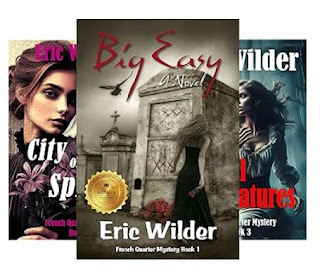

Born near Black Bayou in the little Louisiana town of Vivian, Eric Wilder grew up listening to his grandmother’s tales of politics, corruption, and ghosts that haunt the night. He now lives in Oklahoma, where he continues to pen mysteries and short stories with a southern accent. He authored the French Quarter Mystery Series set in New Orleans, the Paranormal Cowboy Series, and the Oyster Bay Mystery Series. Please check it out on his Amazon author page. You might also like checking out his Facebook page.
March 14, 2024
Thief of Souls - Chapters

In Thief of Souls, Book 11 of the French Quarter Mystery Series, a British pop singer hires disbarred attorney Wyatt Thomas to protect her from the devil. Scheduled as the Jazz Fest headliner, performer Dita Lika visits New Orleans early to seek the assistance of P.I. and paranormal investigator Wyatt Thomas. To help solve the dilemma, Wyatt enlists the assistance of a voodoo mambo, a defrocked priest, and a Harvard-educated historical researcher. What ensues is a whirlwind of paranormal adventure, fantasy, and mystery. Hope you love it.
Chapter 1
Not every horror story begins with a shocking murder. This one does.
Smoke wafted to the ceiling from the bonfire in the center of the large room. Some of the wood in the fire was almost too green to burn and produced a smell neither Charles nor his son Gillet recognized. Instead of a floral fragrance, it smelled like death.
Black drummers dressed in field pants and no shirts sat in a semicircle around the fire, their drumming drowning out any attempt at conversation. When an explosion in the fire pit filled the room with smoke, a Bokor, a mystic of African descent, appeared behind the growing flames.
The Bokor’s skin was blacker than the fire’s coals, and ridges of scar tissue marked every part of his body, not covered with voodoo tattoos. He walked through the flames with impunity, touching the gleaming coals with nothing protecting his bare feet. The drumming intensified as the Bokor’s dance became more frenetic. When the drumming abruptly halted, he stopped dancing and stood in the middle of the fire.
The man’s voice was as deep and dark as his skin when he said, “Who is here to purchase a soul?”
Charles Marchand, dressed like a wealthy plantation owner, sat cross-legged in front of the fire.
“It is I,” he said.
“Is the soul you wish to purchase for you or someone else?” the Bokor asked.
Dr. John smiled when Marchand said, “For my son, Gillet.”
“Twenty pieces of gold is the price I charge for salvation,” Dr. John said.
Charles Marchand stepped forward, pulling a money bag from his light blue silk jacket. Dr. John waited with a smile and an outstretched offering tray as Marchand began counting gold coins into it. When the final coin clanked into the ceremonial tray the drumming continued until the Bokor raised his hand. When he did, the room grew deathly silent.
“Bring the woman who is about to lose her soul to me,” he said.
Two muscular assistants herded a frightened woman into the room. She had raven hair and dark eyes from which tears rolled down her pretty face. In her last weeks of pregnancy, the young woman struggled against the men gripping her arms. When the Bokor addressed her, she refused to meet his gaze.
“What’s your name, girl?” he asked.
“Afrodita,” she said. “You know what it is.”
“What kind of name is that?” he asked.
When Afrodita didn’t answer, Dr. John backhanded her, snapping back her head. Afrodita tried not to cry, though couldn’t quell her tears as blood flowed from her nose.
“It’s my name,” she said.
“You are beautiful, Afrodita. Almost as beautiful as Aphrodite, the Greek Goddess you received your name from. Your beauty won’t save you. You are about to die, and someone has purchased your soul. Without a soul, your destiny is to burn in hell forever. Do you have anything to say?”
“Don’t take my baby. She is innocent,” Afrodita said.
“Such an act of kindness is not without cost. That cost is twenty pieces of gold. Do you have it?”
Afrodita’s blood and tears washed down her face. When she raised her head, Gillet’s eyes met hers. He glanced at the floor, refusing to continue looking into her pleading eyes.
“I have no money,” she said. “Please, spare my baby.”
“Take her to the fire,” Dr. John said.
“Wait,” someone called. It was Charles Marchand. “I will pay for the baby.”
A smile crossed the Bokor’s scarred face as he watched Marchand count out another twenty pieces of gold into the silver offering tray. The drumming began again when the last coin clanked into the tray.
Charles Marchand sat on the floor beside his son Gillet. The handsome young man refused to gaze into the accusing stare of the young woman named Afrodita. Covering his face with a grotesque African mask, the Bokor chanted as he danced in and out of the fire.
As the drumming grew louder, the Bokor’s dance grew more frenetic. Realizing her fate, Afrodita began to struggle. The two men shoved until they had positioned her directly in front of the Bokor. They released Afrodita’s arms, and then retreated to the recesses of the dark room.
A ceremonial knife appeared in Dr. John’s hand. Grabbing Afrodita by the neck, he stabbed the knife deeply into her belly, blood gushing and covering her dress as he plunged his hands into her womb and yanked out a crying baby. Gillet winced as Dr. John held the bloody newborn by an ankle. The drumming continued as Gillet threw up on the floor.
Holding his mouth, Gillet sprang to his feet and ran out of the room. The Bokor brought the crying baby to Charles Marchand as Afrodita lay dying on the floor.
“You have what you paid for,” Dr. John said. “Take it.”
Charles Marchand cradled the bloody baby in his arms, his blue silk jacket ruined. With a nod, he walked to the door and disappeared into the darkness.
Chapter 2
Dita Lika awoke from a violent nightmare with a scream that pierced the walls. The distressed cry awoke her sister Adelina, and she sat straight up in bed. When she burst through Dita’s bedroom door, she sat beside her on the bed and grasped her sister’s shoulders.
“Sis, you were screaming. Are you okay?” she asked.
“I’m good,” Dita said.
“Is there anything I can do?”
“Just a nightmare. Go back to sleep.”
“It’s morning. I needed to get up anyway.”
“Not me,” Dita said. “I was planning on sleeping until noon.”
“Then go back to sleep. Your nightmare wasn’t real,” Adelina said.
“Maybe not to you.”
“What did you eat before going to sleep?”
“A cheese sandwich,” Dita said.
“That’s your problem. Never eat cheese before bedtime. It always causes nightmares,” Adelina said.
Unlike her sister Adelina’s blond hair and blue eyes, Dita’s hair and eyes were dark. Sharr, Dita’s Illyrian sheepdog puppy’s tail, wagged as he scooted beside her. It was Dita’s first time sleeping in bed in many weeks, and she cuddled the puppy to her breast.
“Miss me, baby?” Dita asked.
“You kidding?” Adelina said. “Sharr has the run of the place.”
“It isn’t fair,” Dita said. “You take care of Sharr; he loves you more than me.”
“Not true,” Adelina said. “He’s been so happy since you finished your tour.”
“I wish I could stay for a while. I love touring, though get so tired of the endless hotels.”
“Hah!” Adelina said. “I should be so lucky to order anything I want at any hour of the day or night.”
“You’d soon be as sick of it as I am,” Dita said, “It’s so lonely on the road. I wish I could take Sharr with me,”
“You have other things to consider when you’re touring,” Adelina said. “You have no time to care for a puppy.”
“And no one there to comfort me when I have nightmares,” Dita said. “I think I’m going crazy.”
“You aren’t crazy, Sis. Everyone has nightmares.”
“Not like mine, they don’t,” Dita said.
“Maybe you should consult a psychiatrist.”
“You just told me I’m not crazy,” Dita said. “Now you’re telling me to see a shrink?”
Adelina squeezed Dita’s hand. “You are so beautiful and sexy. Your fans love you.”
“Don’t change the subject, and stop patronizing me,” Dita said. “I’m nothing more than the flavor of the week. When someone else hits the scene, I’ll be little more than a fading memory.”
“Nonsense. You’re a superstar. The most talented musical performer to hit the stage in decades.”
Dita hugged Adelina. “You’re my sister. I wish others saw me the same as you do.”
“Though I may be your sister, I also know it doesn’t take a rocket scientist to see how talented you are. You’re a star; most performers never experience a moment of stardom.”
Dita hugged Adelina and said, “Everyone tells me how beautiful and talented I am when I’m on tour. I must work at it to keep all the false compliments from going to my head. You ground me.”
“You’re as beautiful as you are talented,” Adelina said. “The truth is not a compliment.”
“I’m only your older sister,” Dita said. “You’re giving me the big head.”
“Because you know what I say is true. It isn’t wrong to love the attention and adoration. Now, tell me more about your nightmare.”
Dita pulled off her nightgown, tossing it to the floor.
“I’m awake now, my nightmare a dying memory. Let’s go skinny dipping. I’ll feel better after a swim.”
Adelina’s grin was mischievous as she stripped off her clothes and followed Dita and Sharr out the door. Dita lived in a palatial West Hampstead estate in north London. She’d paid eight million pounds for the house when her first song hit the charts and had begun putting her imprint on the property ever since.
When Dita dived into the courtyard pool, Sharr followed her. Water splashed when Adelina dive-bombed them. They frolicked in the water until all three were exhausted and struggled to climb out of the pool. They didn’t bother putting on clothes as they lay on plush towels.
“You still haven’t told me about your nightmare,” Adelina said.
Adelina shook her head when Dita asked, “Do you believe in Satan?”
“I try not to think about such things.”
“Have you ever had a dream about the devil?” Dita asked.
“I don’t eat cheese before I sleep,” Adelina said.
“That’s not my problem,” Dita said. “My nightmare has nothing to do with what I eat before I sleep. It’s recurrent and starting to scare me.”
Dita nodded when Adelina said, “Tell me about it.”
There wasn’t a cloud in the sky. A car horn down the street honked as Dita stretched out on the plush bath towel and put her arms behind her head.
“It’s always the same,” she said. “I’m in a strange place I don’t recognize. There’s a young woman in the scene so pregnant she looks as if she’s ready to pop.”
“Then the woman in your nightmare can’t be you. You don’t even have a boyfriend,” Adelina said.
“Don’t be critical. Neither do you.”
“Just saying.”
“And, I’ve never been to the place in my nightmare. It seems so strange, exotic, and unknown to me.”
“Paint me a picture,” Adelina said.
“A room so dark and humid, it seems like a dungeon somewhere in the tropics. Men dripping with sweat, beating drums around a fire. It’s like a pagan ceremony, except all the men in the circle are black.”
“Africa?”
“America, I think, though not in this century,” Dita said. “We’re in a large room with an earthen floor. Maybe the basement of a huge house.”
“Who else is there?” Adelina asked.
“Two white men dressed in silk suits that look like something from a French history book. I believe it’s a wealthy man and his son who looks as if he’d like to be elsewhere.”
Adelina smiled and said, “Is he handsome?”
“Very. There is also a witch doctor named Dr. John. He’s presiding over a ceremony that always begins with the beating of drums and him dancing on burning coals.”
“Witch doctor? How do you know he’s a witch doctor?”
“Because of his scars, tattoos, and knowing smile. Someone in the room called him Bokor. I looked it up. It means a voodoo witch for hire who serves the loa with both hands.”
“What does that mean?” Adelina asked.
“A priest who practices good and evil. Bokors are Haitian mystics, though I don’t believe Haiti is where my dream occurs.”
“Where, then?”
“New Orleans.”
“You’ve never been to New Orleans. How would you recognize it?”
“Don’t know,” Dita said. She grinned when Sharr licked her face. “You smell like a wet dog.”
“So, how are you a part of this nightmare?” Adelina asked.
“An observer. The two white men are in the audience, watching though not participating in the ceremony.”
“You keep calling them white men. You’re white.”
“Maybe I wasn’t during another lifetime,” Dita said.
“Are you making this up as we go along?” Adelina asked.
“No way. It’s a different place and time. The men in the room treat the woman like a slave,” Dita said. ‘I had the feeling that perhaps I was a slave.”
“It must have been another time. There haven’t been enslaved people in New Orleans or anywhere else in centuries,” Adelina said.
“That’s what makes the nightmare so strange. It seems so real, yet it’s taking place somewhere I’ve never visited and during a time long before I was born.”
“So, what happened?”
“One of the white men had paid for the woman’s soul. Dr. John was preparing to kill her.”
“Get out of here,” Adelina said.
“It’s true. The woman was resigned to her imminent death but begged the Bokor not to take her baby. He informed her it would cost another twenty pieces of gold.”
Adelina’s hand went to her mouth. “The voodoo man was going to murder the woman and her baby?”
“Exactly. The woman didn’t have the money and was crying her eyes out. The older white man shelled out more gold to save the baby.”
“And then?”
“Dr. John cut the baby from the woman’s womb and gave it to the man who’d given him the gold.”
Adelina’s hand again went to her mouth. “Oh my God!” she said. “No wonder you were screaming. You aren’t pregnant, are you?’
Dita shook her head. “Everyone in the troupe is wary of losing their jobs and half afraid to approach me. I can’t even remember the last time I had sex.”
“Maybe that’s your problem,” Adelina said. “Perhaps you need someone to screw your brains out.”
“Maybe so. Let’s go to Soho and find a walkup,” Dita said.
“Kiss my ass,” Adelina said. “There are no male prostitutes in a walkup.”
“How do you know?” Dita said. “Have you ever visited one?”
“Women don’t have to pay for sex. Especially not you, the most popular female entertainer in the world.”
“You’re full of shit. If that’s true, then why am I so horny?”
“All you need is a few weeks off from the tour. Find a man and stay in bed for a few days.”
“Not a bad idea. What’s my next gig?” Dita asked.
“Jazz Fest in New Orleans. You’re headlining.”
“What’s Jazz Fest?” Dita asked.
“Don’t be a thicko. Jazz Fest is an important music event. Every musical group wants to perform there.”
“You have to be kidding. I can’t go to New Orleans.”
“Of course, you can,” Adelina asked.
“You don’t visit the place where your nightmares occur.”
“Why not?” Adelina said. “Maybe New Orleans holds the answers you seek.”
“I don’t think so.” Dita grabbed her cell phone and dialed her agent. “Raoul, I need to cancel my next engagement.”
“Cancel Jazz Fest? It’s the most prestigious event on your tour. Are you crazy?”
“I’ve never even heard of it,” Dita said. “Who else has played the event?”
“The question you should ask is, who hasn’t played it? The answer is every important musical act,” Raoul said.
“I have reasons for not going to New Orleans,” Dita said.
“Sounds like a personal problem.”
“Very personal. Going there frightens me to death.”
“Doesn’t matter what you want. You’re committed, and it’s too late to back out. Don’t argue with me on this.”
Dita was still talking into the phone when she realized Raoul had hung up.
“What did he say?” Adelina asked.
“He gave me no choice but to attend.”
“The Jazz Fest is in New Orleans, the very city where you are having your insane nightmare,” Adelina said. “Go there and find out what the problem is.”
“What if I lose my soul?”
“Now, what are you talking about?” Adelina said.
“I’m frightened,” Dita said.
“You’re fantasizing about your nightmare, and it’s been bothering you. Check it out while you’re at Jazz Fest.”
“I won’t have time to research my nightmare,” Dita said. “I’ll have a show to perform.”
“You’ll love the place. New Orleans is the birthplace of jazz,” Adelina said. “It’s an exotic city, unlike any other place. As you said, maybe you lived there in another life.”
“Now you’re the one doing the fantasizing,” Dita said.
“I read the brochure Raoul sent you. It seems reasonable your nightmare takes place in New Orleans. It’s just a nightmare. Why are you afraid to go there?”
Dita didn’t answer Adelina’s question. “When does Jazz Fest start?”
“A week from today,” Adelina said.
“Get me a ticket. I’m going tomorrow.”
“You can’t do that. You have to travel with your band,” Adelina said.
“Without me, there is no band,” Dita said. “I’ve made up my mind. Get me a ticket.”
Chapter 3
New Orleans winters are generally warm, though the last one had seen temperatures below freezing twice. Tornadoes had blown through the old city, taking several roofs and a few lives. It made me wonder how many tornadoes New Orleans had survived in its more than three-hundred years of existence.
I’d gained a few extra pounds over the winter, a warm spring breeze begging me to get outdoors, exercise, and lose weight. Rain clouds raced over the French Quarter when I finally laced my jogging shoes and took the trolley to City Park.
City Park is an oasis of nature not far from the French Quarter. It’s bigger than New York’s Central Park and boasts the most extensive collection of live oak trees worldwide, some over six-hundred years old. I’d lost count of the times I’d jogged through the park. Its lagoons, wildlife, gardens, and beauty still amazed me every time I visited.
My run through the park invigorated me, and I’d worked up quite a sweat. Too sweaty to ride the trolley, I decided to continue on foot back to Bertram’s. My decision proved ill-advised when thunder sounded overhead, and the cloudy skies morphed into a spring rainstorm, my jogging shorts and tee shirt drenched long before I saw the neon lights of the French Quarter.
Bertram Picou, my landlord, and close friend, owned the most eclectic bar in the Quarter. His customers and tourists had gone home or to their hotels because of the rain. He caught my attention when I pushed through the door, pointing his Gallic nose at a woman sitting alone at the bar.
The attractive young woman was humming to herself as she filed her fingernails. She grinned and held her hand toward me as I stood dripping on Bertram’s old oiled-wood floor.
“Are you Wyatt Thomas?” she asked.
“Yes. I got caught in the rain during my jog.”
I noticed her British accent when she said, “I’m Dita. Can we talk?”
I pointed to the creaky staircase leading to my apartment. “I live upstairs. If you don’t mind waiting a bit longer, I’ll shower and change out of these damp clothes.”
“Take your time,” she said. “Bertram and I are having a lovely conversation.”
Dita’s cut-off jeans were too short, and her cowboy boots and thigh-length red, white, and blue leggings were too brash. Her black cowboy hat paired with Lucy-in-the-Sky-With-Diamonds sunglasses was anything but understated. I turned around when Bertram called my name.
“I fed that mangy cat of yours. Her yowling was running off my customers.”
“Sure they didn’t leave because of the rain?” I asked.
“Don’t be an ingrate,” he said.
“Thanks,” I said.
Bertram had indeed fed my cat Kisses, and I found her asleep on my bed.
She didn’t open her eyes when I said, “Too wet to go tomcatting?”
I hung my sticky jogging shorts and tee shirt on the back of a chair, waited for the water to get hot, and then luxuriated in the steamy heat. Not more than fifteen minutes had passed when I returned to the bar dressed in khaki pants, sandals, and a blue Hawaiian shirt that would have made Elvis proud.
Dita smiled when she said, “Feeling better?”
“Think I’m going to live. Sorry for taking so long,” I said. “The hot water felt so good I had trouble leaving it. “What can I do for you, Dita?”
“I have a problem. Your name came up as someone who might help me.”
“What kind of problem,” I said.
“Something of a psychic nature. My people tell me you’re more than a private investigator,” Dita said.
“Oh?”
“They say you know about the paranormal, and voodoo in particular,” she said.
“Me and everyone else in New Orleans. Did Bertram bring you a drink?”
“I don’t drink when I’m discussing business.”
Bertram pushed a glass of lemonade across the bar toward me.
“Me either,” I said. “At least not alcoholic beverages. My coonass friend makes wonderful lemonade.”
Bertram’s elbows rested on the bar as he listened to every word we said.
Dita smiled when he said, “I brew a mean cup of Earl Grey.”
“You sell tea in a bar?” Dita asked.
“Whatever floats your boat,” Bertram said. “Costs the same as a lime mojito.”
“How much does a lime mojito cost?” Dita asked.
“Ten bucks,” Bertram said.
“I can get a lime mojito at any pub in London for seven pounds.”
“It’s a long way to London from here, pretty lady. Make you a deal. Buy one of my lime mojitos, and I’ll throw in a crumpet for free.”
“Deal,” she said.
Bertram grinned as he mixed Dita’s mojito and presented her with the drink and a fresh pastry.
“This isn’t a crumpet,” she said.
“It’s a beignet,” he said. “Try it.”
Dita took a bite of the succulent pastry and then another. “This is good,” she said. “What is it?”
“A beignet from down the street,” Bertram said.
“You didn’t make it yourself?”
“I’m a man of many talents. Making beignets isn’t one of them. Try the mojito,” he said.
Dita took a sip and said, “Very good. You could find work at any pub in London.”
“They couldn’t afford me,” Bertram said. “I’ll get you another beignet.”
“No,” she said. “I have to watch my figure.”
“You kidding? You got better legs than a movie star.”
“I’d gain weight in a heartbeat if I didn’t work out daily,” Dita said.
I interrupted their bantering and said, “Tell me about your problem.”
“It has to do with voodoo,” she said.
“I’m listening.”
“You’re not put off talking about voodoo?”
“Voodoo’s a common topic around the French Quarter,” I said.
Thunder shook the roof, rattling the light fixtures.
“Is it always this stormy?” she asked.
“Pretty much,” I said. “At least this time of year. Hope it doesn’t scare you.”
“Few things frighten me,” Dita said. “My nightmare that recurs practically every night is disturbing, even to me.”
“Please tell me about it,” I said.
“It concerns a voodoo man named Dr. John. Did such a person ever exist in New Orleans?”
“Marie Laveau is the most famous female voodoo person from the past, Dr. John, the most notorious male voodoo practitioner,” I said.
“How long ago?” Dita asked.
“1840s,” I said. “Your nightmare involves Dr. John?”
“The devil and Doctor John are villains in my nightmare. It’s always the same. A voodoo ceremony in an empty room with a dirt floor. Shirtless men are beating drums, their driving rhythm the percussive music for Dr. John’s walk across a bed of hot coals.”
When she paused, I said, “Go on.”
“Dr. John’s face and body are covered with scar tissue. It appears symbolic and looks like someone administered the cuts with a scalpel or sharp knife. He looked quite frightening in the light of the fire.”
“You said you’re in a dark room,” I said.
Dita nodded and said, “Like the basement of a large house.”
She shook her head when I asked, “Where does the smoke go?”
We both turned our attention to Bertram and said, “It’s a nightmare. It don’t have to make sense.”
Bertram didn’t reply when I said, “Dita feels her nightmare is real. She wouldn’t have traveled from London to tell us about it if she didn’t. Am I right about that?”
Dita nodded. “I don’t know where the smoke went. There must be a plausible explanation because everything seems so real.”
“Then tell me more,” I said.
“Dr. John addresses a woman brought from somewhere as Afrodita.”
“Your name,” I said. “Are you the woman in the dream?”
Dita shook her head. “She is about my age, though someone I don’t recognize. She is also pregnant. Dr. John tells the woman someone has purchased her soul and he will kill her as a sacrifice to Satan.”
“Damn!” Bertram said. “Your story’s scary. I need a lemon drop.”
“What’s a lemon drop?” Dita asked.
“Vodka, lemon juice, and sugar,” Bertram said.
Thunder shook the rafters again as Bertram grabbed three shot glasses from beneath the bar, filling mine with lemonade and the others with the lemon drop concoction he’d mixed in a blender.
We clicked glasses, drained them, and said, “Bottoms up.”
“Good?” Bertram asked when she licked her lips.
“Tastes like lemon drop candy,” she said.
“Just the way it’s supposed to taste,” Bertram said. “Sorry I interrupted you.”
“Finish your story,” I said.
“Where was I?” Dita said.
“Dr. John told the pregnant woman named Afrodita that he was about to kill her,” I said.
“An older white man responded when Dr. John asked who was paying for the soul.”
“Did you recognize him?” I asked. Dita shook her head. “Then describe him for me.”
Dita nodded. “A handsome man. Early fifties. Dark hair and eyes. His clothes were regal. Blue velvet coat, hand-sewn vest, and brown silk pants custom made and from a different century. He gave Dr. John twenty pieces of gold.”
“There must have been a reason he was buying a soul,” I said.
“For his son, Gillet. His father called him by his first name,” Dita said.
“That’s a place to start,” I said. “What did Gillet look like?”
“Long brown hair. Delicate facial features. He was crying and couldn’t look the woman in the eye when she begged Dr. John not to kill her baby. The voodoo man told her it would cost another twenty pieces of gold.”
“Heartless bastard,” Bertram said.
The lights flickered, the storm raging outside. An unexpected gust of wind rustled the front door.
“A ghost?” Dita asked.
“More than likely,” I said. “Lots of ghosts in the French Quarter.”
“Are you trying to frighten me?” Dita said.
“There are ghosts in this bar,” Bertram said.
“Get out of here!” Dita said.
“I’ve seen them,” Bertram said. “Some of them are famous.”
“Like who, for instance?”
“Louis Armstrong. He came around one morning early,” Bertram said. “Sang and played his horn for me until sunrise.”
“You’re full of it,” Dita said.
“If I’m lying, I’m dying,” he said.
Dita glanced at me and said, “Have you ever seen a ghost?”
“More than you can imagine,” I said.
“You’re both full of it,” Dita said. “Don’t be stingy with your lemon drops.”
Bertram poured more shots. “I’ll fix another batch if you help me drink it.”
Dita fumbled in her Gucci bag for a fifty-pound note and handed it to Bertram.
“Why not?” she said.
Bertram grinned and stashed the note in his shirt pocket.
“You were telling us about Gillet,” I said.
“After Dr. John collected the twenty pieces of gold, he cut the baby from Afrodita’s womb. Gillet grabbed his mouth and ran out of the room. His father ruined his beautiful clothes when he took the bloody baby in his arms.”
“Damn!” Bertram said.
“Afrodita didn’t scream when Dr. John took the baby. I believe she had a smile on her face as she lay on the floor bleeding to death.”
“Double damn!” Bertram said.
“What exactly do you need me to do?” I asked. “Nightmares can’t kill you.”
“Are you quite sure about that?” she said. “The answer to your question is I haven’t a clue as to what to do,” she said.
Dita flinched when thunder rattled the rafters. She was young, probably no older than in her early twenties. Her accent and outfit labeled her as worldly. Her unsure questions informed me she was grasping at straws. She raised her psychedelic sunglasses to let me see her face. When I didn’t react, she smiled.
“You have no idea who I am, do you?”
“You’re Dita Lika,” I said.
“Oh, my God! I underestimated you. Have you caught one of my shows?”
“I’m an information junkie. I soak it up like a sponge. I saw your picture in the Picayune. You’re headlining this year’s Jazz Fest.”
It took Dita a moment to say, “Amazing. You’ve never seen me perform?”
“I like music, though I rarely listen to it.”
“You live in New Orleans and aren’t a music maven?”
“I don’t go to movies, either,” I said.
“You are strange.”
“I hear that,” Bertram said.
“You know who I am, don’t you, Bertram?”
“You got the best set of legs I ever seen,” Bertram said. “I’d know if I ever saw you before now.”
Dita pulled out her cell phone, calling up a music video on YouTube. Bertram and I drew close to the phone as the video began to play. The primary performer was Dita Lika. After watching the video, I realized it didn’t take a musical genius to see she was a generational talent.
“Damn, girl!” Bertram said. “You dance as good as you sing. No wonder you got class-A legs.”
When Dita put away her phone with a smug smile, I said, “I’m available to help.”
“I’ve been here before,” she said.
“At Bertram’s?” I said.
“New Orleans. Jazz Fest begins next week. I want you to stay close to me.”
“Jazz Fest has lots of security. You don’t need me. You’ll never be in danger.”
Before Dita could continue, thunder shook the rafters again, and the electricity went out. From the darkness outside the front door, Bertram’s wasn’t the only French Quarter establishment affected.
“Does this happen often?” Dita asked.
Bertram lit a candle and placed it on the bar between us.
“Enough so that I keep candles and storm lanterns under the counter,” Bertram said. “Hope you don’t mind drinking by candlelight?”
Dita was grinning. “Love it,” she said. “The lights should go out more often.”
Bertram grabbed his cell phone. “I’ll find out what’s going on.”
After hanging up, he poured us another shot.
“What happened?” I asked.
“An electrical fire at the Roosevelt,” he said.
“Bad?” I asked.
“The lights are out, and the hotel is full of smoke,” Bertram said.
“Damn!” Dita said. “I was booked at the Roosevelt.”
“Not tonight,” Bertram said.
“It’s still early, and we can worry about your hotel accommodations when they restore the electricity,” I said.
Realizing the blender was empty, Bertram poured lemon juice, vodka, and sugar into his blender.
“No electricity,” I said. “Remember?”
He grabbed a wooden spoon from beneath the bar and said, “Right. I’ll have to fix the next batch like my mama used to do.”
“I better call a cab and find a room,” Dita said when they’d finished drinking the last batch of lemon drop shots.
“I live in a suite of rooms behind the bar,” Bertram said. “There’s an extra bedroom with its own bathroom. You’re welcome to stay there for the night.”
Dita glanced at me and said, “Is Bertram trustworthy?”
“You don’t run a bar in the French Quarter for as long as Bertram has without being trustworthy. If you can trust anyone, it’s him.”
“I’ll take you up on your offer,” she said. “Jet lag has caught up to me. I need some sleep and feel good about the two of you.”
Dita grinned when Bertram said, “Except for the whipping part, we’ll treat you just like your mama.”

###
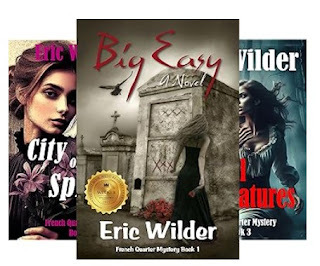


Born near Black Bayou in the little Louisiana town of Vivian, Eric Wilder grew up listening to his grandmother’s tales of politics, corruption, and ghosts that haunt the night. He now lives in Oklahoma, where he continues to pen mysteries and short stories with a southern accent. He authored the French Quarter Mystery Series set in New Orleans, the Paranormal Cowboy Series, and the Oyster Bay Mystery Series. Please check it out on his Amazon author page. You might also like checking out his Facebook page.



